Houseboat Vs Yacht (Differences & Comparison)

August 30, 2022

This article may contain affiliate links where we earn a commission from qualifying purchases.
For most people, a houseboat and a yacht refer to the same thing. But is that the case? This houseboat vs. yacht comparison guide has the answer.
If you are looking to spend some of your time living on the water, you can either purchase a houseboat or a yacht. After all, they are the same thing, right? Not exactly. Houseboats are yachts are two different water vessels.
A houseboat is more of a floating house. It’s specifically built for permanent residence in water. And while it can move around, most houseboats spend the majority of their time moored to a port. Yachts, on the other hand, are designed for leisurely water activities like racing and vacations.
In this houseboat vs. yacht comparison guide, we will take a closer look at how these two water vessels compare. We will explore their designs, the different types available, their floor plans, and their pricing. And by the time you finish reading this guide, you will have a clear idea of the differences between a houseboat and a yacht. Also, this guide will help you to know the right choice for your needs.
We aim to provide our readers with informative, well-researched, and trustworthy content. And this is made possible thanks to our ever-dependable team, composed of respected journalists, experienced researchers and various other experts, drawn from different specializations. So, whenever you come across any type of content piece on our site, you can rest assured that the information you are getting is credible.

Table of contents
One of the main differences between a houseboat and a yacht is their design or appearance. If you take a closer look at a houseboat, you will notice it resembles something that looks like a floating home. And this explains why it’s called a houseboat. It’s a combination of a small house and a boat, thus the name.
A yacht, on the other hand, looks like an ordinary boat. Hence, it’s almost impossible to confuse the two, in terms of appearance, since they are considerably different.
A notable difference in their appearance is the hull. Considering that different water vessels come with different types of hulls, this is also the case with these two. For a houseboat, you will notice that it has a flat bottom hull. The flat bottom hull is designed to enhance its stability in the water since it spends the majority of its time docked alongside a pier, berth, or slip.
On the other hand, yachts come with V-shaped hulls. The V-shaped hull is designed to enhance the vessel’s agility and speed. Unlike houseboats, yachts spend most of their time moving around on the water. And this explains why they come with this type of hull design.
So, if you come across a water vessel that has a flat-shaped hull, it’s highly likely you will be looking at a houseboat. On the other hand, if it has a V-shaped hull, the chances are it’s a yacht or other similar water vessels built for agility and speed.
But, it’s also worth mentioning that some high-performance boats like tournament waterski boats also have flat-bottomed hulls. This hull design is to enable them to skim smoothly on the water surface.
Similar to other water vessels, houseboats and yachts come in different types, shapes and sizes. So, if you are looking to purchase any of these two water vessels, here are the different available types.
There are two main types of houseboats. These are static or non-cruising houseboats and bluewater or cruising houseboats. Each of these two types is built for a specific purpose and utilization.
Static Houseboats
As their name suggests, static households are not built for moving around. Most of the time, they are anchored or moored to a designated spot, which may be a dock or marina. Static houseboats are the most popular out there.
Non-cruising houseboats come equipped with almost all the modern conveniences that you would find in a normal house. However, these boats like propelling mechanisms, meaning you can’t move around in them.
Cruising Houseboats
A cruising houseboat is almost similar to a static houseboat, in terms of design and furnishings. But, it comes with a propelling mechanism, which may be a sail or engine. These are designed for individuals that want to travel around in a floating house. They are mainly built for vacationing.
But, as much as you can move around in a cruising houseboat, you can’t operate it on open or high oceanic seas, meaning you can only cruise with it on small water bodies. Cruising houseboats are not as popular as their static counterparts are.
While there are two main types of houseboats, you will come across numerous types on the market, branching from these two basic ones. Some of the different kinds of houseboats that you will find on the market include:
Pontoons are flat-looking cruising houseboats, mainly made from materials like wood, marine-grade aluminum, plastic, steel or fiberglass. They are mainly designed for vacationers. Pontoons are popular among houseboat lovers because of their practicality, stability and affordable prices. Also, they are easy and safe to operate and their maintenance costs are minimal.
Barges are large houseboats, which can be moved around or permanently anchored at the bay. Barges are the most popular houseboat styles due to their generous amounts of storage space. A conventional barge can accommodate approximately 10 people, making them ideal for families.
Trailerable
Trailerables are houseboats with a narrow and long design. Their narrow design makes them ideal for cruising small river systems and canals. Its name comes from the fact that you can tow it with a vehicle and move it around since it’s lightweight. Trailerables are smaller than the majority of other houseboats. But, if you only wish to spend a short amount of your time in the water, then a Trailerable will be the ideal vessel.
Floating Home
A floating home is a non-cruising houseboat, ideal for people who don’t want to cruise around in their boats. It’s a great retirement home for someone who wants to spend the majority of their time staying on the water. Floating homes are among the cheapest houseboats. They are affordable to build and easy to maintain.
River Houseboat
If you are planning to be living permanently on water, then you should consider building or buying a river houseboat. Houseboats are usually made of fiberglass. Also, they are customizable, meaning you can have them built according to your specifications. River houseboats and you can furnish them with various conveniences.
Full hulls are popular houseboats that you will mainly find in the U.S. Full hulls come with a spacious interior, meaning they can accommodate several people. And thanks to their design, they have higher buoyancy, meaning they can handle rougher waters better than most other types of houseboats.
Just like houseboats, yachts come in different types. Yachts can be categorized based on size and purpose, among others. Let’s take a closer look at the different yachts that fall under each of these categories.
When it comes to size, you can buy a smaller yacht, medium-size yacht, mega yacht or a super yacht. As you may expect, the bigger the yacht, the more it’s going to cost you to buy and maintain.
Smaller Yachts
Smaller yachts range between 10 meters to 20 meters. The majority of smaller yachts are usually privately owned. They are mainly used for water recreational activities like water sports or cruising. These yachts can be sail-driven, motor-driven or a combination of both.
Medium-sized Yachts
Medium-size yachts range from around 20 meters to 30 meters. They are ideal for tourist groups or bigger families. Medium-sized yachts may have a small crew for operating and maintaining them.
Super Yachts
These yachts measure around 30 to 50 meters long. They come with several nice features like sky lounges, Jacuzzis, bars and dining rooms. They can be sail-driven or motor-driven. Superyachts also have a professional crew for serving the people on board.
Mega Yachts
These are the biggest yachts currently. They are usually owned by super-rich individuals since they are quite costly. Some are also owned by organizations that offer water tourism. Megayachts measure around 50 meters long or even more. Similar to superyachts, mega yachts also have a dedicated crew that works round the clock. They are also adequately outfitted with numerous luxurious facilities and amenities like cafeterias, swimming pools, suite rooms, restaurants, gyms, conference banquets and pubs, just to name a few.
Different yachts are built for different purposes and target markets. Some of the different yachts that fall under this category include:
Cruiser Yachts
As their name suggests, these yachts are mainly built for moving around or vacationing. Cruiser yachts come in different types and sizes. They are built for long-distance trips. Luxury yachts usually fall under this category.
Sports Cruisers
These yachts are built for short fast traps and water sports activities. They are quite compact and smaller in size than most of the other yachts. And as you may expect, their accommodation spaces are also limited.
Fishing Yachts
Fishing yachts are purposely built for fishing and leisurely activities. They come with adequate space for storing fishing gear. These yachts come with open decks, to make fishing easier. While you can use them in various fishing spots, they are not allowed for deep-sea fishing.
Expedition Yachts
If you love exploring or touring using water vessels, then expedition yachts are the perfect fit for you. They are built for long-distance water trips and vacations. Expedition yachts are given permission to explore remote and uncharted locations, which is usually not the case with cruiser yachts.
Trawler Yachts
Trawler yachts are also fishing vessels. However, they are built for large-scale or commercial fishing. But unlike ordinary fishing yachts, trawler yachts come with some comforts like sleeping bunks, since the crew may spend several months fishing.
Comfort and Livability
You can live on both a houseboat and a yacht. However, yachts tend to be more expensive compared to houseboats per square footage. Therefore, for the average person, a houseboat provides the most practical, affordable and convenient option.
Houseboat Floor Plan
The floor plan of a houseboat resembles that of a conventional house. As for the yacht, its floor plan resembles that of a conventional boat. For a houseboat, there will be a living room, bathroom, bedrooms and a fully-equipped kitchen, meaning it accommodate an entire family.
Considering that houseboats have a shape that is almost similar to that of a residential home, you will notice that their layouts are also similar. So, in case you live in an area where property prices are too high, you can simply opt for a houseboat. You will have almost similar living quarters at an affordable cost.
Yacht Floor Plan
As earlier mentioned, yachts are mainly designed for leisure activities like water sports, boat parties, fishing and weekend getaways. Therefore, they are mainly designed for vacationing and not long-term living in the water.
As for the floor plan, its layout will be similar to that of a boat. However, a yacht will come with more luxury features and comforts compared to a conventional boat. For instance, most speedboats don’t have indoor living spaces. They usually come with a captain’s seat and a bench. Some may also have a low table, but this feature is quite rare in speedboats.
A yacht, on the other hand, will have several luxurious features, which you can’t find in a speedboat. The main issue with yachts is that interior space is quite limited. While it may appear posh and luxurious, it lacks enough space, meaning it’s not ideal for long-term living on the water. Also, yachts tend to have limited headroom, compared to houseboats.
When you compare the two, you will conclude that a houseboat will be cheaper per square footage, compared to a yacht. If you browse the prices for these two water vessels of comparable size, you will notice that a yacht will cost you considerably more than a houseboat.
Wrapping It Up
A houseboat and a yacht are similar in various ways. Both are built for people that want to spend time in the water. But, they also have considerable differences. A houseboat is more of a floating house, designed for those who want to establish a permanent residence on water. Yachts, on the other hand, are ideal for recreational purposes. So, if you are looking to settle permanently close to a water body, then a houseboat will be the ideal choice. On the other hand, if you are planning on going for a vacation or other water-based recreational activities, then a small yacht will serve you well.

Best Houseboat Fishing Trips

Best Houseboat Food

Best Houseboats For The Money

Best Houseboat Financing
About THE AUTHOR
Brian Samson
I have a deep love of houseboating and the life-changing experiences houseboating has brought into my life. I’ve been going to Lake Powell on our family’s houseboat for over 30 years and have made many great memories, first as a child and now as a parent. My family has a passion for helping others have similar fun, safe experiences on their houseboat.
Trending Now

Tips To Living On A Boat In Key West

Best Used Houseboats

Best Boats For Caribbean Island Hopping

Best Houseboat Marinas
After spending over 30 years on houseboats, the memories and knowledge we've gained will never fade. Learn from our experiences here on LakeWizard. You can read more about us and our team, here .
©2024 LakeWizard. All rights reserved.
You can email us at [email protected]
LakeWizard.com is a participant in the Amazon Services LLC Associates Program, an affiliate advertising program designed to provide a means for sites to earn advertising fees by advertising and linking to Amazon. This site also participates in other affiliate programs including but not limited to ShareASale, CJ, and ClickBank, and is compensated for referring traffic and business to these companies.
7 Differences Between Houseboat and Yacht: Choose Your Oasis
Discover the essentials: from space and luxury to cost and mobility, make an informed choice between houseboats and yachts today.
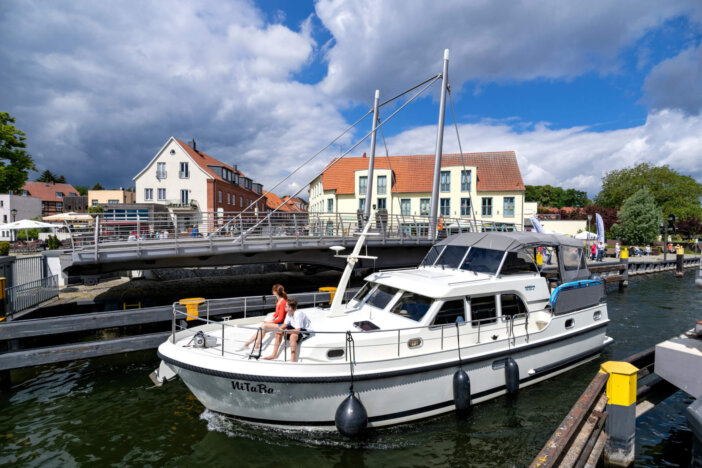
Houseboats and yachts are two distinct forms of living on water. They differ in design, mobility, cost, and accessibility. Here are the seven key differences to consider when choosing between them.
Disclosure: As an Amazon Associate, this site earns from qualifying purchases. Thank you!
1. Design and Mobility
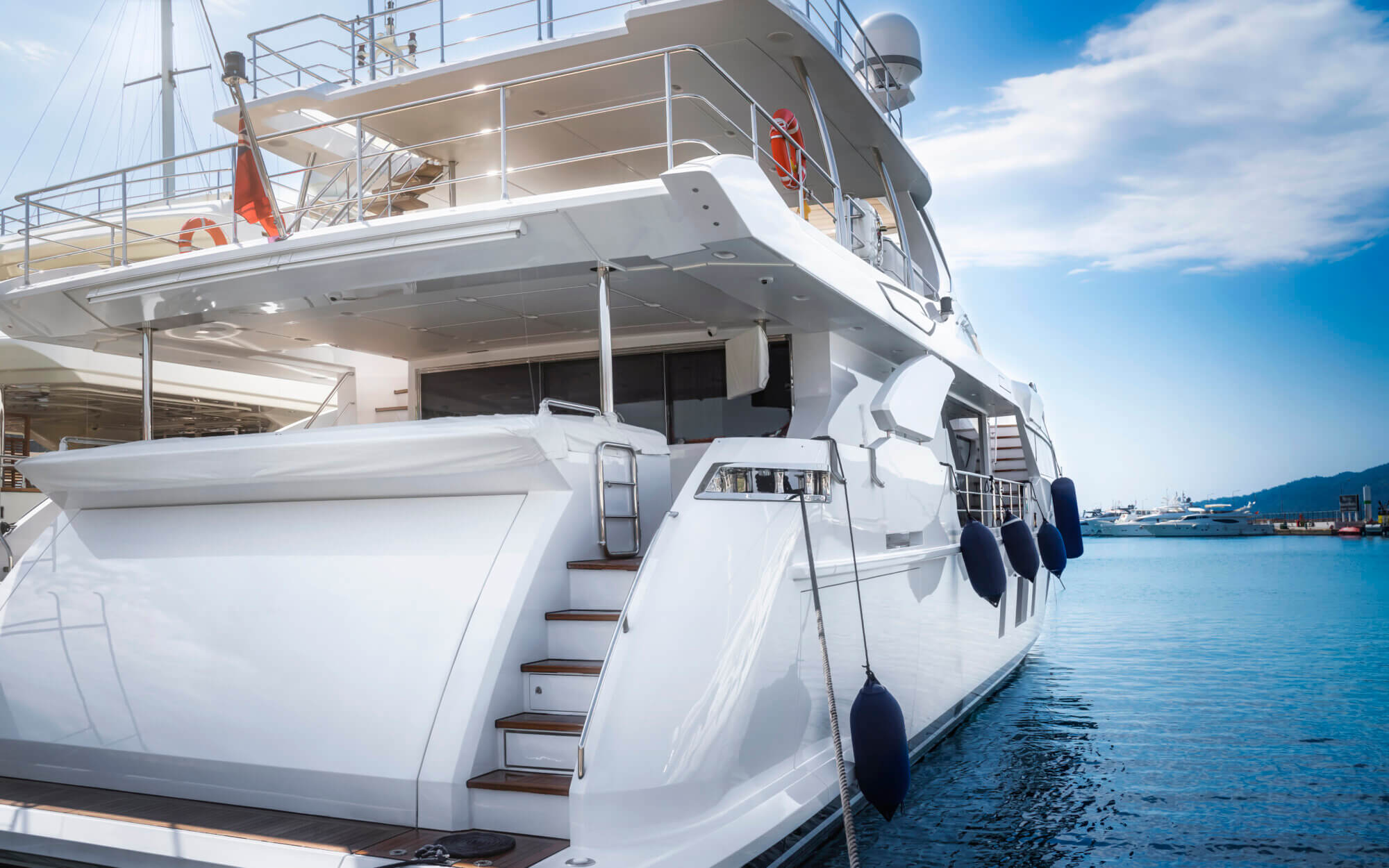
At first glance, the primary difference between a houseboat and a yacht is their design and purpose. A yacht is a vessel primarily designed for pleasure cruising, often associated with luxury and speed, making it ideal for those desiring an adventurous marine lifestyle.
On the other hand, a houseboat is more akin to a stationary home on the water, designed for comfort and extended stays at a fixed location, perfect for those seeking tranquility and stability.
When it comes to mobility, yachts have the upper hand. They are built for high-speed travel across open waters, allowing you to explore various ports of call.
In contrast, houseboats are typically moored at a specific location and aren’t meant for long-distance travel. However, some houseboats can navigate short distances within calm waters, such as lakes and rivers.
2. Amenities and Comfort
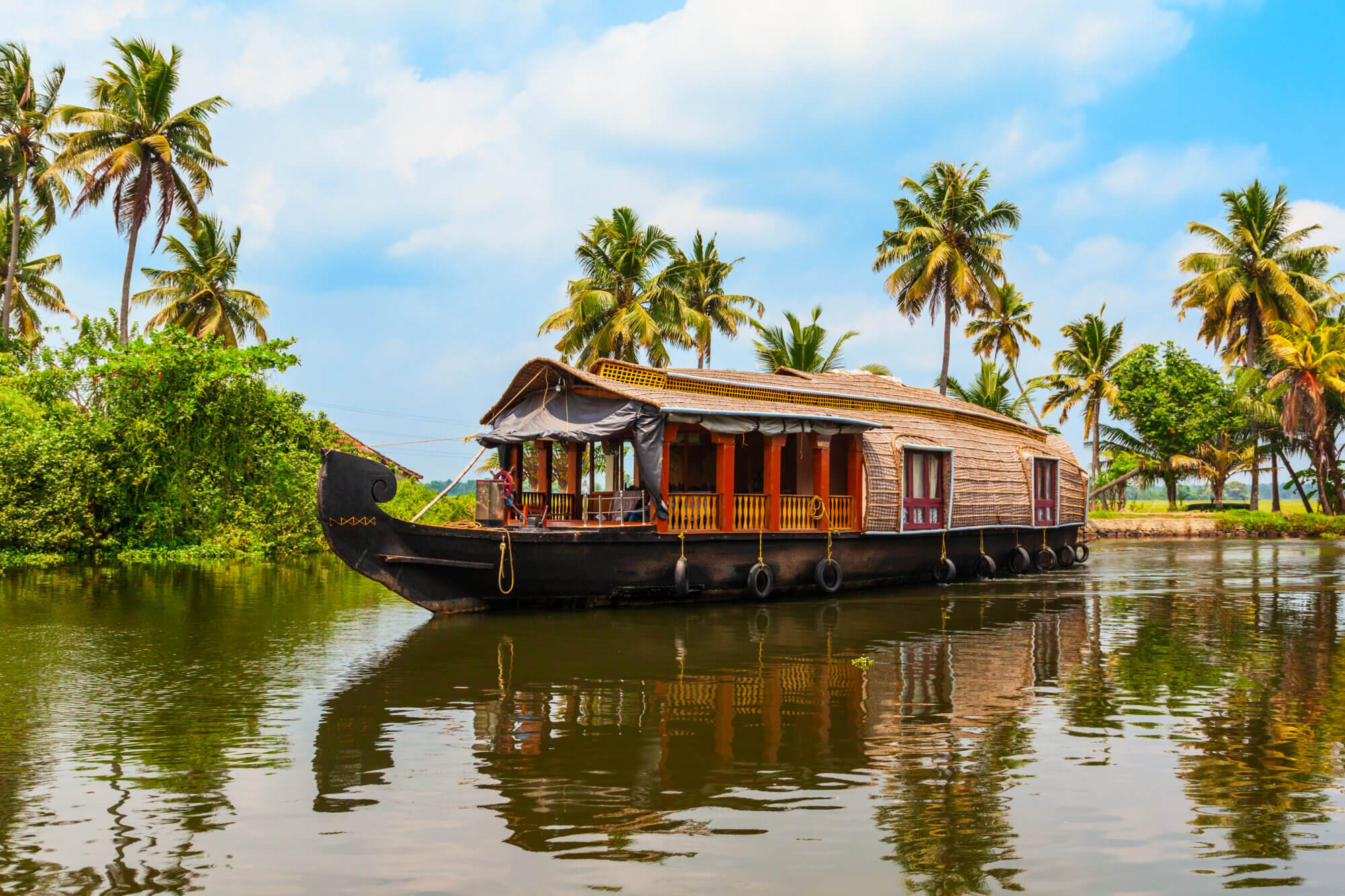
Both houseboats and yachts can be equipped with luxurious amenities. However, the type and extent of these amenities largely depend on the size and design of the vessel.
Yachts, particularly larger ones, can feature multiple bedrooms, full-size kitchens, spacious living areas, and even extravagant extras like Jacuzzis and home theaters. They are designed to provide comfort while maximizing space efficiency.
Houseboats, on the other hand, prioritize residential comfort over mobility. As a result, they often offer more living space . They can be equipped with amenities similar to those found in traditional homes, including larger kitchens, full-size bathrooms, and expansive living areas.
Some houseboats also feature outdoor spaces, such as decks and patios, for residents to enjoy their aquatic surroundings.
3. Ownership and Maintenance
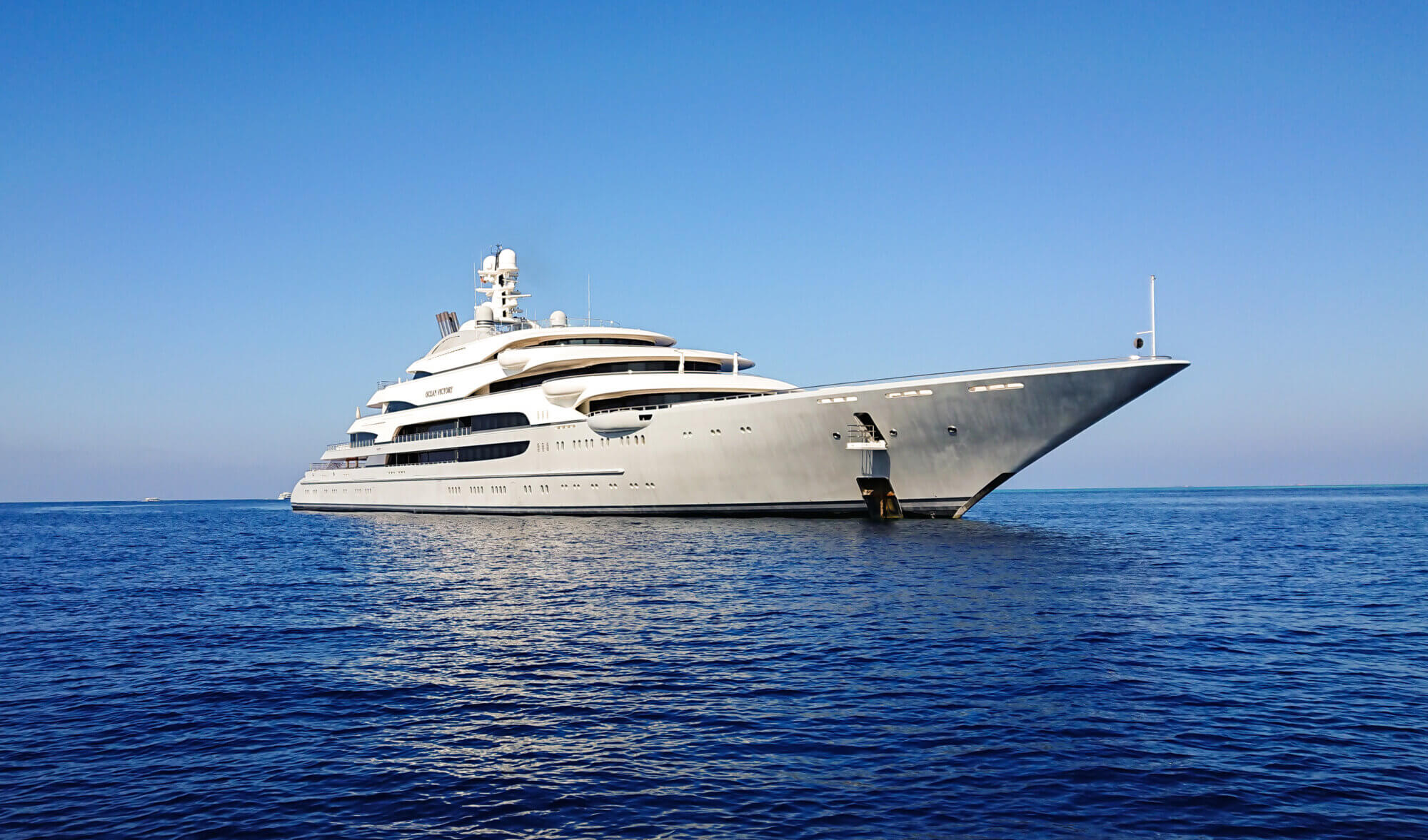
Ownership of a yacht or a houseboat comes with its own set of responsibilities and costs. Yachts, due to their complex designs and high-end features, typically require more maintenance.
This can include regular engine servicing, hull cleaning, and upkeep of onboard systems. Furthermore, yachts depreciate over time, which can impact their resale value.
Houseboat ownership, while seemingly simpler, has its own unique challenges. These floating homes need regular maintenance to prevent water damage and corrosion.
Additionally, owners must pay docking or mooring fees , unless they own the water lot where the houseboat is moored. Nonetheless, houseboats tend to depreciate at a slower rate than yachts, making them a potentially better investment in the long run.
4. Travel and Exploration
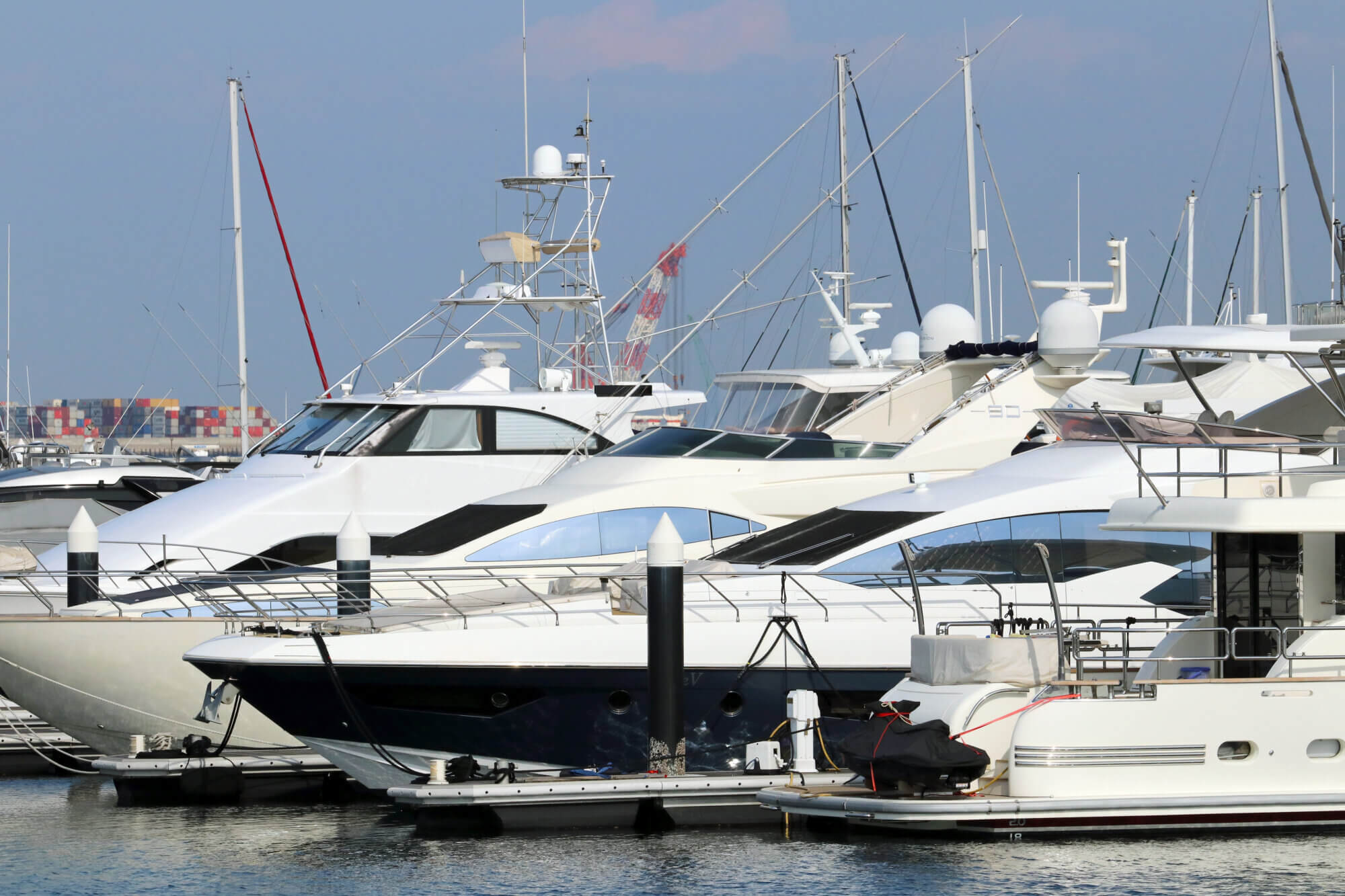
The allure of a yacht lies in its promise of travel and exploration. With the right yacht, you can cruise across oceans, visit exotic locations, and enjoy the thrill of navigating open waters.
Moreover, yachts offer a certain level of prestige and social status, making them popular among the affluent.
On the other hand, houseboats offer a different kind of adventure – the chance to live in harmony with nature, surrounded by serene waters.
While not designed for ocean cruising, houseboats are perfect for those who prefer a quiet, stable living environment with the unique experience of being on the water. They offer an escape from the hustle and bustle of city life without sacrificing the comforts of home.
5. Community and Lifestyle

Yacht and houseboat ownership also differ in terms of community and lifestyle. Yacht owners often enjoy a vibrant social scene, with opportunities to participate in yacht club activities, regattas, and exclusive events. The yachting lifestyle is often associated with luxury, adventure, and social prestige.
The houseboat community, meanwhile, tends to be more laid-back and close-knit. Living in a houseboat community often means knowing your neighbors and participating in community events.
This lifestyle appeals to those seeking peace, tranquility, and a strong sense of community on the water.
6. Cost and Accessibility
The cost of owning a yacht or a houseboat can vary significantly. Yachts are generally more expensive due to their design, construction, and amenities.
The cost of yacht ownership also includes maintenance, insurance, docking fees, and fuel costs. Despite these expenses, yachts can be chartered out when not in use, providing a potential source of income.
Houseboats, on the other hand, are often more affordable. While they have maintenance and docking costs, these are typically lower than those associated with yachts.
Houseboats also offer greater accessibility to the liveaboard lifestyle, making them a popular choice among retirees and those seeking alternative housing options.
Plus, some houseboat communities provide shared amenities like utility hookups, laundry facilities, and community centers, further enhancing their appeal.
7. Purpose and Usage
The purpose and usage of houseboats and yachts differ greatly. As a pleasure vessel, a yacht is ideal for those who enjoy sailing and sea travel. It offers the excitement of exploring new locations and the thrill of mastering marine navigation.
In contrast, a houseboat serves as a floating home, providing a unique living experience on the water. It’s best suited to those who enjoy a peaceful, stable living environment with the added charm of life on the water.
At what point does a boat become a yacht?
A boat becomes a yacht when it reaches a certain size, usually around 10 meters (33 feet) in length, and is used for pleasure or sport. The term ‘yacht’ also implies a certain level of luxury and comfort, as well as the ability to undertake longer, more adventurous voyages.
What is the difference between a boat and a houseboat?
While both are types of watercraft, a boat and a houseboat serve different purposes. A boat is a general term that refers to various vessels used for transportation, fishing, sports, or leisure activities.
A houseboat, however, is specifically designed as a dwelling with residential amenities and tends to remain stationary or travel short distances within calm waters.
Is a houseboat seaworthy?
Most houseboats are not designed to be seaworthy in the same way as yachts or other ocean-going vessels. They are intended for use on calm bodies of water such as rivers, lakes, and protected coastal areas.
However, some houseboats are built with more robust designs and materials, allowing them to handle rougher conditions. It is crucial to understand the capabilities and limitations of your houseboat before venturing out into open waters.
What makes a boat become a yacht?
A variety of factors can turn a boat into a yacht. These include its size, purpose, design, construction, and the level of luxury it offers. A yacht typically exceeds 10 meters in length and is designed for pleasure or sport.
It often features advanced navigation systems, high-quality construction materials, luxurious amenities, and sophisticated design elements that set it apart from other boats.
Whether you lean towards the adventurous allure of a yacht or the tranquil charm of a houseboat, what matters most is finding a vessel that fits your lifestyle, preferences, and budget.
Both offer unique ways to experience life on the water, each with its own set of benefits and challenges. So weigh your options, consider your priorities, and make the choice that will bring you the most joy and satisfaction.
Similar Posts

5 Best Electric Trailer Jacks for Effortless Maneuvering

7 Essential RV Park Design Plans for an Attractive & Successful Site
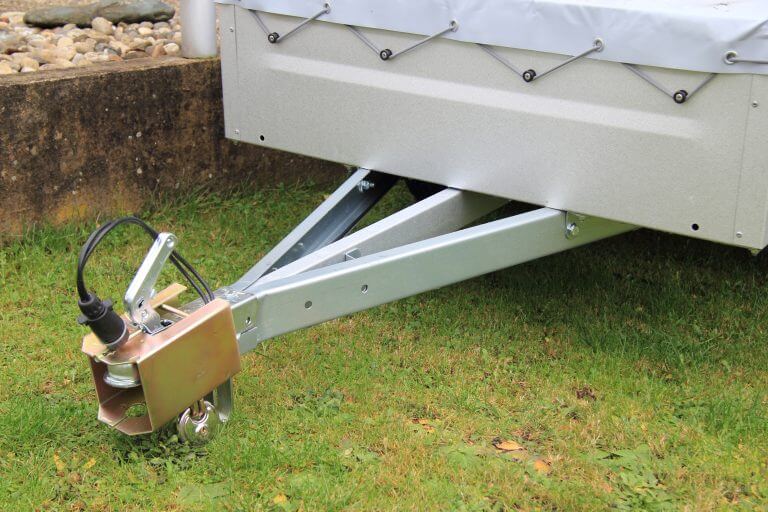
5 Best Wheel Locks to Secure Your Trailer Tires Effectively

Top 10 Ultra Lightweight Pop-Up Campers for Effortless Travel

6 Tips for a Quiet Generator for Camping – Enjoy Peaceful Nights
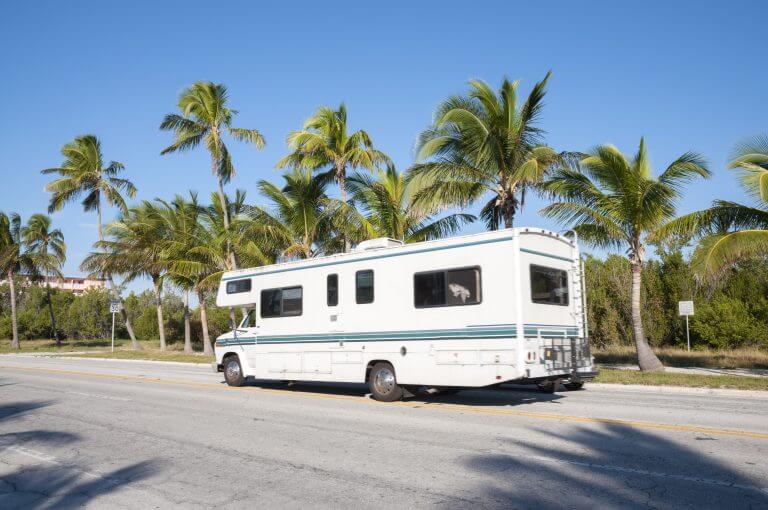
7 Essentials of RV Living in Florida: A Complete Guide
- Testimonials
- Photo Gallery
- Window Replacement Parts

Which is Better: Houseboat or Yacht?
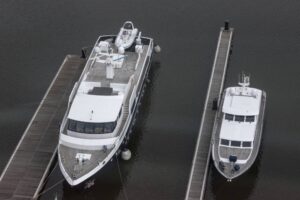
Houseboats are more affordable than yachts. One reason is that they are easier to maintain and are not sailed frequently. A yacht is more expensive because of its commercial use. Plus, the maintenance on a yacht is more tedious due to its high-class build and luxurious features aboard.
Yachts are usually priced around $300,000 to one million dollars, whereas you can buy a houseboat for as low as $15,000.
Size and Appearance
One major difference between the two is in appearance. Houseboats usually look like houses floating in the water, while yachts look like small cruise ships. Yachts are faster and more appropriate for sailing because of their planing hulls. On the other hand, houseboats only have flat hulls that’s why they’re mostly stationary.
Both are big enough to live in, but typical yachts are more cramped on the inside than houseboats, which is why they’re used mostly for recreation.
Purpose and Intended Use
Yachts are more luxury boats or non-recreational vessels. They are typically known for their speed, beauty, and other luxurious features. Plus, they are more famous for formal events, parties, and oceanic relaxation.
Houseboats are vessels with basic features that are only needed for comfortable day-to-day living. Because of their flat hulls, houseboats don’t move as fast in the water and might require more fuel to go from one place to another. This is why most houseboats are stationed permanently in marinas. A houseboat can accommodate one or more families depending on the vessel size. If you ask around in areas with houseboats, you’ll find out that some families have lived in their houseboats for generations.
Still, houseboats are also great for commercial use. After all, they were originally designed for that. If you don’t plan to live in a houseboat, they can make great restaurants or cafes in the marina. But for commercial use, yachts are the better investment. You can host parties or events, and with their mobility, you can take your business anywhere.
Houseboats typically have a much larger living space than yachts . They feature amenities that are great for living, like bedrooms, an indoor kitchen, and bathrooms. In marinas, other houseboat owners create a sort of tight-knit group with each other, so if you plan to live in one, expect friendly neighbors to socialize with.
A yacht is too big for one person, financially and space-wise. Plus, yachts won’t be able to provide enough space for a family. So houseboats are more practical if you’re planning to live in such a vessel. However, expect to invest in insurance eventually to cover for damages or break-ins that may happen in your houseboat.
Maintenance
Both houseboats and yachts experience wear and tear that requires routine maintenance to function smoothly. When it comes to houseboat maintenance, one of the essentials that owners can do is make sure that their houseboat sits on a good foundation. House barges are especially susceptible to damage from leaks in the hull. As water seeps into the boat, wood swells, and metal corrodes.
Houseboats generally last longer because they are not made to travel fast or far or need expensive maintenance as most yachts do. Since houseboats are much cheaper to buy, houseboat owners will also save money on houseboat upkeep. Yacht maintenance can cost up to $10,000 a month, while houseboat owners only have to pay for houseboat slip at the marina and fuel.
If you want to give a houseboat a more homey look, it may require a lot of renovations like new flooring, putting up drywall, and setting up bathrooms. Plus, they typically need electric and water supply and sewage. Yachts, on the other hand, are already built with those.
In retrospect, either houseboat or yacht will have the same maintenance cost. Yachts may cost more initially, but they require less upkeep in the long run because you won’t sail your yacht unless needed. On the other hand, houseboats may cost less but may require unexpected costs like foundation repairs.
So, a houseboat or yacht? The answer will depend on your specific needs and preference. It will also depend on how much money and time you will spend on the vessel. Both are excellent investments with each having its uniqueness that you’ll love.
Finally, whether you go with a houseboat or a yacht, you’ll be needing quality marine windows for privacy and safety. Marine windows are durable and intended to withstand strong wind and water splash. If you notice any crack in your boat windows, look for the best replacement in the market today.
Motion Windows of Peninsula Glass offers high-quality marine glass windows that are customizable to fit any size of boat window.
So if you need a new marine glass window for your houseboat or yacht, call Motion Windows and get a free quotation !
Author: Hai N |
Recent Posts
- Clear Vinyl for Windows: What do you need to know?
- How to Keep Boat Windows from Fogging Up?
- What should you do to avoid colliding with another boat?
- Boat Windows Tips: How to Remove Scratches from Glass Windows
- Can I use Marine Acrylic Glass in Boat Window?

WaterCraft 101
Your guide to fun on the water!
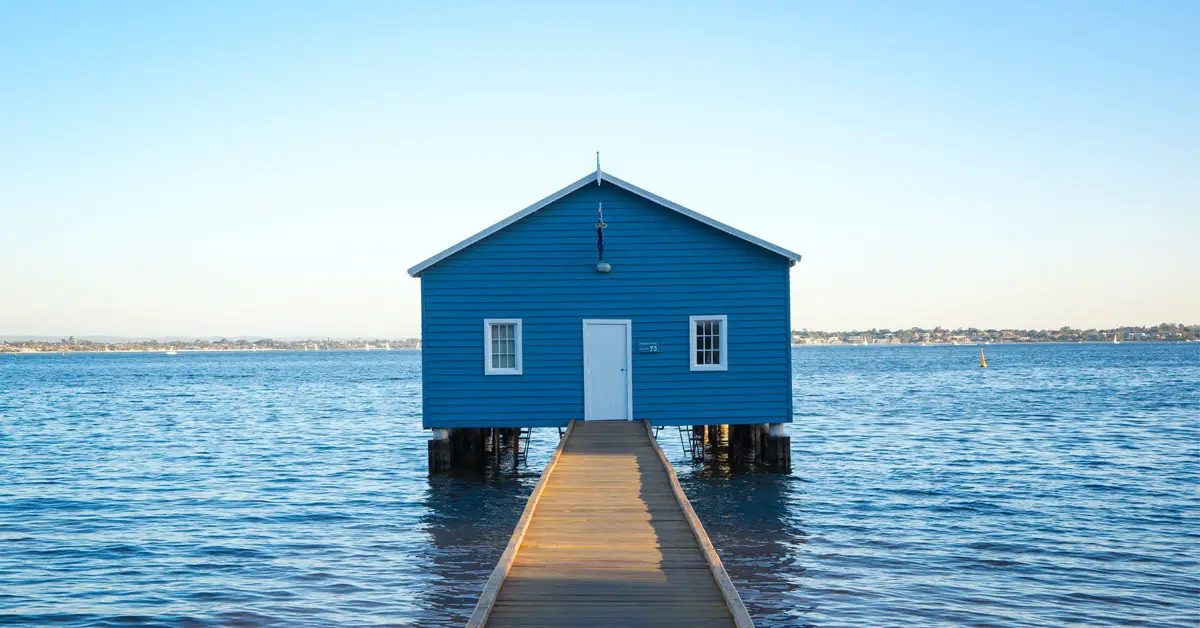
Boathouse vs. Houseboat: Choosing Between a Boathouse and a Houseboat for Your Waterfront Lifestyle
The choice of a waterfront lifestyle can bring about an interesting dilemma: Should you opt for a stationary dwelling on the water’s edge or a floating sanctuary that moves with the ebb and flow? This fundamental question often finds individuals at a crossroads, contemplating the allure of the two distinct yet intertwined options.
Choosing between a boathouse and a houseboat depends on your lifestyle preferences. If you desire mobility, adventure, and a close connection to the water, a houseboat may be your pick. But a boathouse could be preferable if stability, more living space, and a fixed community are important.
With the promise of serene mornings by the water and peaceful nights under the stars, each offers a unique perspective on life, bringing you closer to nature and providing a refuge from fast-paced city life. Today, we delve into this topic, discussing the pros and cons of each to help guide your decision.
Table of Contents
Understanding the Essence of a Boathouse

As its name suggests, a boathouse is a structure designed specifically for storing boats, typically with direct access to water bodies such as lakes, rivers, or even the ocean. However, modern boathouses often transcend this basic utility and embody the fullness of a comfortable dwelling.
These homes, built at the water’s edge, provide a sense of permanence and stability that contrasts with the transient nature of life on the water. Boathouses often offer more spacious living arrangements than their floating counterparts and may include a broader range of amenities.
With a stunning waterfront view, the allure of a boathouse lies in its capacity to blend the tranquility of a waterside retreat with the comforts and conveniences of a traditional home.
The Intriguing Allure of Houseboat Living
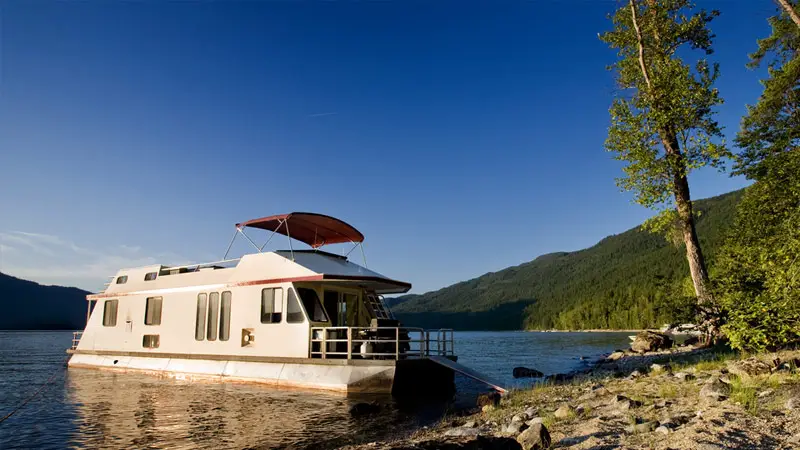
Houseboat living represents the epitome of a fluid, unhurried existence, free from the constraints of a fixed location. This lifestyle provides a unique opportunity to experience the world from a different viewpoint, literally floating atop the water’s surface.
Houseboats offer less space than traditional homes or boathouses and are ingeniously designed to maximize every inch, offering cozy and functional living quarters. They introduce a sense of adventure and mobility, allowing residents to relocate at will, exploring new locales while taking their home along for the journey.
Living on a houseboat equates to embracing a life tethered to nature’s rhythm, where the gentle rock of waves can lull you to sleep, and your morning view can change with your whims.
Comparing Costs: Boathouse and Houseboat Maintenance
When considering a waterfront lifestyle, it’s essential to weigh the financial implications of your choice. Both boathouses and houseboats come with their maintenance costs that, over time, can significantly affect your budget.
Initially, a boathouse might appear more costly due to land ownership and construction costs, but the long-term upkeep of a houseboat could balance the scales. Understanding these costs is critical to making an informed decision.
Boathouse Maintenance Costs:
- Construction and Renovation: Building or renovating a boathouse can be a costly venture, depending on the size, location, and desired amenities. Costs might include architectural and design services, construction labor, and building materials.
- Utilities and Taxes: Unlike houseboats, boathouses often require connections to city services like water, electricity, and sewer systems. Also, land taxes apply to boathouses.
- Regular Upkeep: Regular maintenance tasks include cleaning, painting, and minor repairs to keep the structure in good condition.
Houseboat Maintenance Costs:
- Initial Purchase: Depending on size, design, and luxury level, houseboats can range widely in price. Older models may require refurbishment, further adding to the cost.
- Docking Fees: Houseboats need a place to dock, and marinas charge fees for this, which vary widely depending on location and amenities.
- Insurance: Insurance for a houseboat is typically higher than a traditional home due to the risk associated with living on the water.
- Maintenance and Repairs: Like all boats, houseboats need regular maintenance to stay seaworthy. This includes hull cleaning, engine maintenance, and occasionally costly repairs.
Life on the Water: Exploring the Lifestyle Differences

Embarking on a waterfront lifestyle is an adventure, whether you opt for a boathouse or a houseboat. The two choices offer distinctive lifestyles shaped by their unique features and inherent nature. A boathouse provides a rooted experience, being physically connected to the land, while a houseboat offers an exciting life of fluidity and change, tethered to the whims of the water. Let’s explore these differences further:
Boathouse Lifestyle:
- Stability: Boathouses offer the stability and familiarity of a traditional home, making it ideal for those who prefer a fixed address and a sense of permanence.
- Space: Boathouses typically have more space, allowing for larger families or more belongings. It can also accommodate guests more comfortably.
- Amenities: With a connection to land-based utilities, boathouses often have access to the same amenities as a regular home, such as internet and cable TV.
- Community: Living in a boathouse usually means being part of a lakeside or riverside community with nearby neighbors and shared public spaces.
Houseboat Lifestyle:
- Mobility: Houseboats offer the unique advantage of mobility, allowing you to change your scenery whenever you wish. You can explore different areas without leaving the comfort of your home.
- Closeness to Nature: Living in a houseboat means intimately connecting with the water and its inhabitants. You might find yourself sharing your mornings with passing waterfowl or evenings with the sound of waves.
- Limited Space: Space is typically more limited in a houseboat, requiring careful organization and a minimalist approach to belongings.
- Different Community Feel: A houseboat community can be transient as neighbors come and go, fostering a unique camaraderie among fellow water dwellers.
Location, Location, Location: Traveling with a Houseboat vs. Living on the Dock
The allure of a houseboat lies significantly in the promise of mobility and ever-changing views. With a houseboat, you can navigate to different locations, exploring new communities, landscapes, and waterfronts. This option appeals to those with an adventurous spirit and a desire for change.
As a houseboat dweller, you can choose to be anchored in a tranquil, secluded bay one day and docked at a bustling marina the next. Additionally, traveling to different places provides an exciting cultural and social exploration platform. However, it’s worth noting that while houseboats do offer mobility, many still choose a ‘home base’ marina where they primarily reside, venturing out occasionally.
On the other hand, a boathouse provides a fixed location, a constant address that offers a sense of community and belonging. Located on the water’s edge, boathouses provide stunning views, easy water access, and the stability of a land-based home. Although boathouses don’t offer the same mobility as houseboats, they provide an established connection with a specific location and community.
Living in a boathouse means joining the local community, participating in local events, and building long-term relationships with neighbors. Choosing between a traveling houseboat lifestyle and a dock-based boathouse lifestyle depends on your personal preferences and lifestyle goals.
The Versatility of Space: Comparing Comfort and Amenities

A significant factor to consider when choosing between a boathouse and a houseboat is the versatility of space and the level of comfort and amenities each provides. Generally, a boathouse, given its solid, land-based structure, can offer more spacious and diverse living arrangements. A houseboat, while compact and ingeniously designed, is typically more limited in space due to its need for mobility and buoyancy. Here’s a closer look at what each option brings to the table:
Boathouse Comfort and Amenities:
- Space: Boathouses, being stationary, often offer larger living spaces, which could include multiple rooms, a full-size kitchen, larger bathrooms, and outdoor areas such as patios or decks.
- Amenities: As land-based homes, boathouses can have standard home utilities and appliances, such as a dishwasher, washer and dryer, full-sized refrigerator, and more.
- Storage: With more space usually comes more storage, allowing for a broader range of personal belongings, furniture, and equipment.
- Expansion Possibilities: Given the right permits and land availability, a boathouse could be expanded or renovated.
Houseboat Comfort and Amenities:
- Compact Living: Houseboats are typically designed for compact, efficient living. This can mean cleverly designed fold-out furniture, convertible spaces, and smart storage solutions.
- Mobility-Friendly Amenities: Amenities on a houseboat are tailored for life on the move, with things like marine appliances, compact furniture, and storage designed for minimal movement while in transit.
- Limited Storage: Space is at a premium on a houseboat, so storage is typically limited. This can necessitate a minimalist lifestyle or creative storage solutions.
- Connection to the Outdoors: While space might be limited, houseboats often have deck space for outdoor living and a more intimate connection with the surrounding water.
Safety Concerns: Houseboat and Boathouse
Safety should always be paramount when deciding on your living arrangements, and both boathouses and houseboats have their own sets of safety concerns that need to be thoroughly considered.
For boathouses, potential issues to consider include the following:
- Flooding: Being located on the water’s edge, boathouses can be at risk of flooding, especially during heavy rain or in areas prone to high water levels.
- Access: Some boathouses, especially those in remote locations, may have limited access, making it more difficult for emergency services to reach if necessary.
- Weather: Boathouses may be more exposed to harsh weather conditions, such as storms or high winds, which can lead to damage or safety issues.
For houseboats, safety concerns might include the following:
- Navigation: Operating a large houseboat requires some degree of skill, and there can be risks associated with navigation, particularly in crowded or difficult waterways.
- Water Safety: Living on a boat requires good water safety practices. This includes knowing how to swim, having proper safety equipment, and understanding the risks associated with water.
- Maintenance: Houseboats require regular maintenance to ensure they remain seaworthy. Failure to maintain a boat can lead to critical safety issues.
Regardless of your choice, it’s important to understand these potential safety concerns and take necessary precautions to mitigate risks. Ensuring that your dwelling meets all local safety codes and regulations is also essential.
Bryan is a Las Vegas resident who loves spending his free time out on the water. Boating on Lake Mohave or Lake Havasu is his favorite way to unwind and escape the hustle and bustle of the city. More about Bryan.
Similar Posts
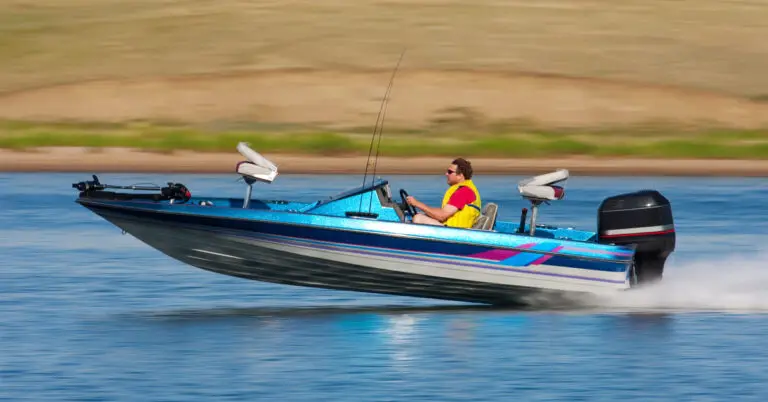
Why Should Boaters Slow Down While Passing Recreational Fishing Boats? Explained
As a passionate boater, there’s nothing quite like gliding over the open water, the wind whipping through your hair, and the sun warming your face. I can still remember the first time I took the helm and the excitement and sense of freedom that came with it. But as much as we love to let…
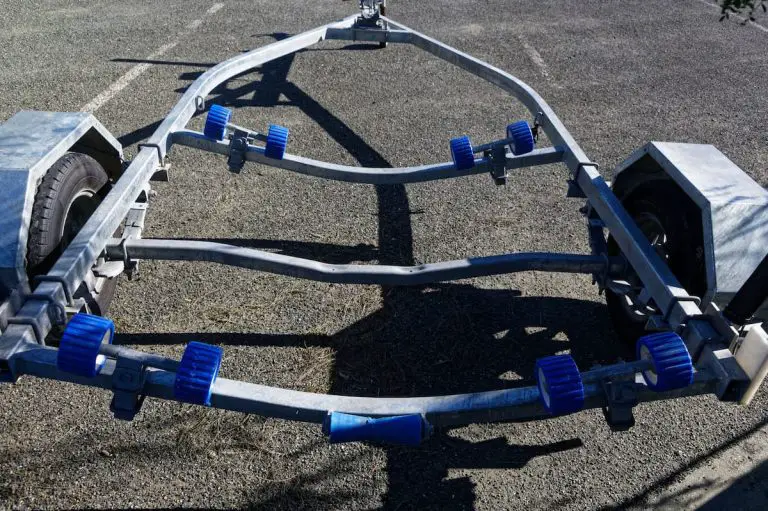
Should Your Boat Rest on a Keel Roller? (Explained)
Boat care is an essential and detailed part of owning a boat. It is good to familiarize yourself with your boat’s specific cleaning, storage, and hauling needs before purchasing it or taking it on a trip. There are several pieces involved in trailering your boat; one part that boat owners are frequently troubled by is…
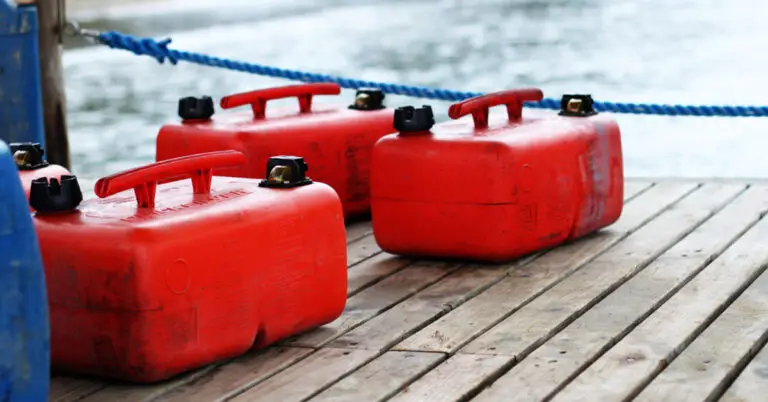
Why Should a Boat Gas Tank Never Be Completely Filled? Essential Tips for Safe Boating
Boating enthusiasts love the thrill of being on the water, but it’s important to remember that safety should always come first. One aspect of boating safety that is often overlooked is the proper filling of the gas tank. While it may seem like a good idea to fill the tank to the top, it’s actually…

The Importance of Tidal Awareness When Boating on Coastal Waters: Tips and Guidelines for Safe and Enjoyable Boating
Navigating the intricate dance of the tides is an essential skill for any coastal boater. Understanding the rhythm of the sea not only enhances the pleasure of your maritime journey, it significantly contributes to your safety. This article is an essential read for every seafarer aspiring to master the ebb and flow of the ocean….

Tugboat Propeller Size: Exploring the Importance of Propeller Size in Tugboats
Navigating maritime architecture and engineering, one may find themselves caught in a whirlpool of intricate components and exacting specifications. Each element, each facet holds its weight in this realm. Let’s drift further into the world of tugboats: these seemingly inconspicuous yet powerful marvels of the marine world. The propeller size in tugboats is crucial for…

How Does WiFi Work On a Boat? (Explained)
Over the last few decades, boats have become better equipped with new technologies for safety and efficiency. Over that time, communications have been revolutionized by the internet. So can you access the internet from a boat when you’re out on the lake or at sea? Boats don’t have built-in WiFi as standard equipment. While modern…

What to know about floating houses and houseboats
Floating houses and houseboats have become popular in recent years, and now that more people have the freedom to work remotely wherever they want, it’s possible that these housing units will see an increase in demand.
Thinking of owning a floating house or houseboat? Want to know what’s the difference and which one is right for you? Here’s what you need to know about floating houses and houseboats before you make your purchase.

What is a floating house?
A floating house is a type of housing that is attached to a dock on the water, which could be a river or lake. The building is an actual house — not a boat at all — and is connected to the local sewer and utility lines. Floating houses cannot move, but they are right on the water.
Designs of floating houses tend to lean very modern with sleek lines and repurposed materials. Some have two stories with lots of big windows to take in the view while others devote a little more space to the deck and patio.

What is a houseboat?
A houseboat is a boat that can allow owners to live aboard them permanently. They do not need to be connected to the local sewer or utility lines. Houseboats have motors, which means owners can move their homes around the lakes or rivers at their discretion.
Difference between floating home and houseboat
The biggest difference between a floating home and a houseboat is movement. While houseboats can move freely, floating houses cannot. They rely on local sewer and utility lines, and they do not have motors built into them. While it is possible to move a floating house, it would be far more difficult than moving a houseboat.
Houseboats also tend to be less expensive than floating homes and a bit smaller, but that, of course, depends on the houseboat. Yachts can be houseboats if they’re big enough, and they’re better equipped to handle rough waters, which regular houseboats are not.
Benefits of owning a houseboat or a floating home
What houseboat and floating house owners love most about their homes is the ability to live on the water and close to nature. For those that love fishing, swimming and nature watching, you can beat the accessibility of a houseboat or floating home. When it’s time for dinner, many owners simply throw a line out their window.
The serenity of nature also draws many to the houseboat or floating house lifestyle. The docks where these owners live are usually away from city noise and traffic, which means they’re quieter and less developed. Much of the natural beauty of the land and water remains intact, so it’s much easier to appreciate wildlife.
Owning either a houseboat or floating house also gives you potential rental income. If you have a permanent home elsewhere, then you can rent out your floating property for bachelor and bachelorette parties, reunions or honeymooning couples. There’s a great market for floating properties, so if you’re worrying about paying for a second mortgage, renting out your new property can help you make up the difference.
Living in a boat: pros & cons
When it comes to living on a houseboat, there’s no denying that the ability to pick and move your home to a new city or town is a major plus. If you’re retired and want to see Virginia or Maryland from a new angle, then owning a houseboat will grant you the freedom to move as you please and see the area from a perspective that you’d otherwise miss.
Unlike floating houses, houseboats need to pay a rental fee when docked in a marina. While some own a slip on their home base docks, it does mean that houseboat owners will have to pay rent when in a new area.
When it comes to rocking, houseboats owners usually feel much more movement than floating house owners. This is because floating houses have a much larger base, so the rocking is more evenly distributed and far less noticeable.
From those looking to downsize, a houseboat will be a better fit than a floating house. Most houseboats can have about two bedrooms at max (unless it’s a yacht), but floating houses can have more bedrooms and bathrooms. That space, however, does come at a premium, so expect to pay much more for a floating house than a houseboat.
Want to rent out your houseboat or floating house near Washington, DC? Contact Atlas Lane to learn how to get started .
Ready to get started with Atlas Lane?
Continue reading.

How to rent out an apartment
7 Important Clauses Landlords Need to Have in their Lease
15 Small Basement Layout Ideas to Maximize Space in Your Home
Let's get started.

Where Residents Experience Home.
Washington, DC Locations
Northern virginia (nova) locations.
Yacht vs. Houseboat: What's the Difference?
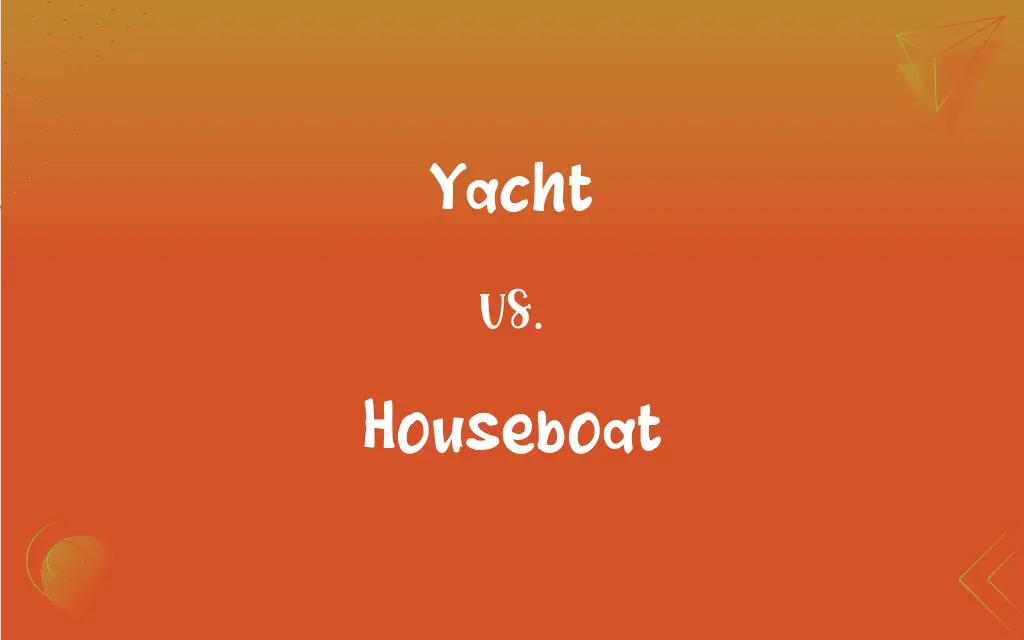
Yacht and Houseboat Definitions

Trending Comparisons

Popular Comparisons

New Comparisons

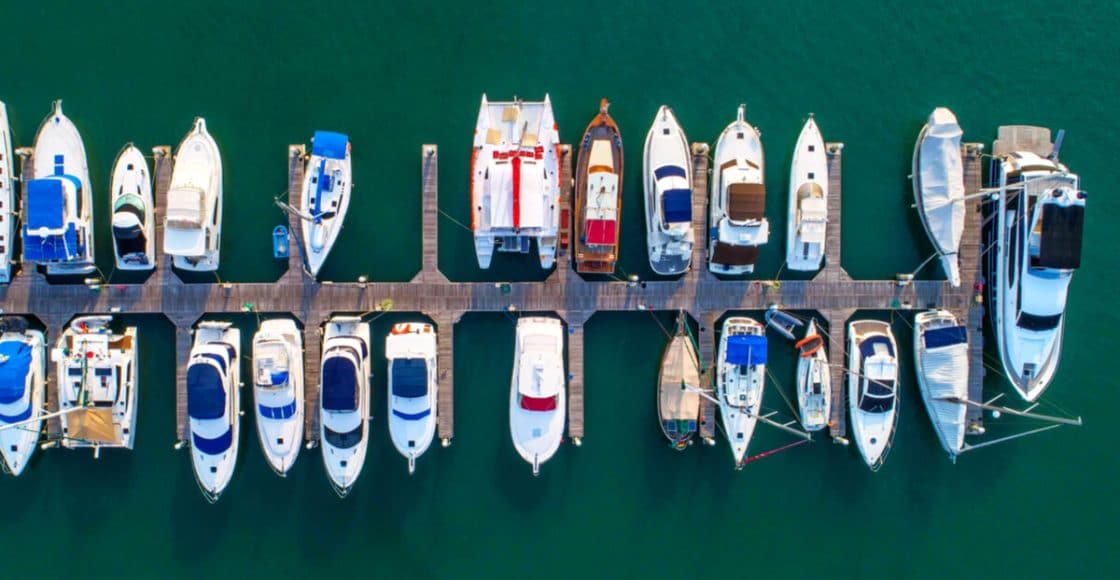
Yachts vs. Boats: What are the Differences?

Table of Contents
Many people use the words “boat” and “yacht” interchangeably, and some lean on the latter to make their ride sound more impressive. But what are the key differences between boats and yachts?
First, let’s look at some broad definitions of a boat, a yacht, and other related vessels.
- “Boat” can refer to just about any kind of vessel— towboat , fishing boat , center console , houseboat , and so on.
- “Dinghy” designates a small boat with a human or wind means of propulsion including a rowing dinghy or sailing dinghy. It also refers to a tender to a bigger boat or yacht.
- “Ship” is a large commercial boat, often used for distance travel and transport of goods or passengers – cruise ship, container ship, etc.
- “Yacht” is typically a larger boat with luxury amenities used as a recreational vessel— motor yacht , sailing yacht .
- “Superyacht” is a large yacht and is often also called a mega yacht . The delineation used to be at 80-feet but again, with today’s size creep, anything under 100 feet would just simply be called a yacht.
So, yacht or boat? Let’s dive deeper into the elements that differentiate a boat from a yacht.
Own a Boat or a Yacht? Learn How to Offset the Cost of Ownership by Listing on Boatsetter
Size of the Vessel
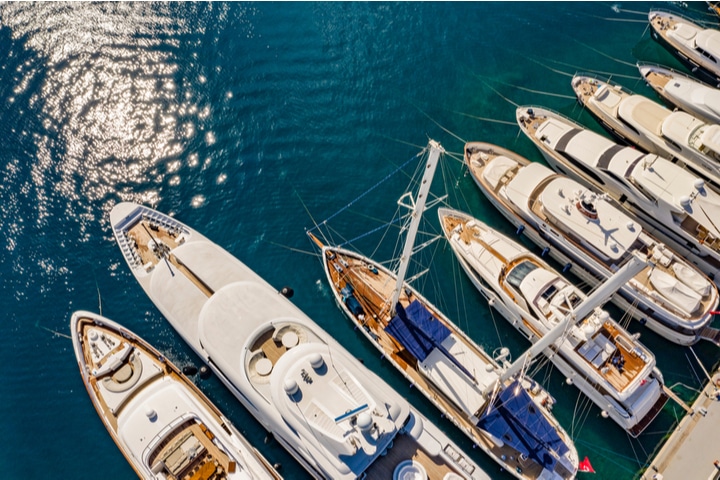
Some place a hard line at 35 feet. Below that, you have a boat and above, it’s a yacht. However, that’s an artificial differentiator.
Just 30 years ago, a 30-foot boat was considered large and could have been a yacht but as recreational boats grow longer, the term yacht has been pushed up the scale.
That said, a well-kept 40-foot boat designed for recreation can technically still be called a yacht (although larger vessels are likely to cost more, price isn’t a good indicator of yacht status primarily because it fluctuates with brand, age, and amenities).
Check out local yacht rentals near you to understand how size plays a difference.
What it’s Used For
A yacht is a vessel designed for recreational purposes. It generally operates on open waters (rather than small lakes or rivers) and has accommodations for overnight guests.
A cruise ship, on the other hand, accommodates a large number of passengers in a commercial setting whereas a yacht carries a smaller number (of paying or non-paying) passengers for private recreation.
Onboard Technology
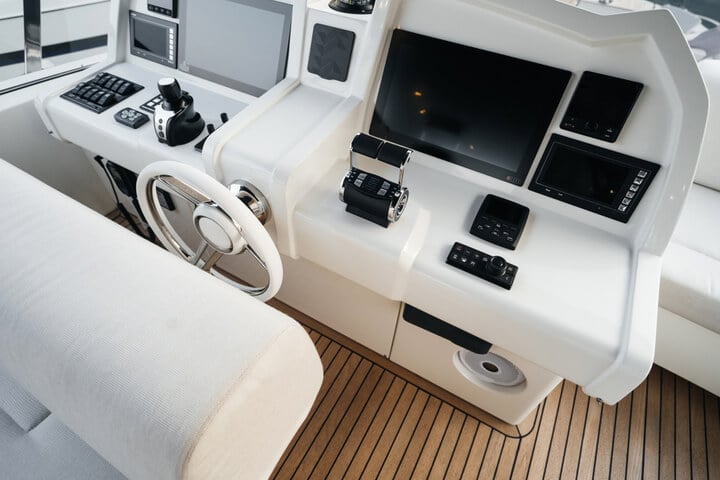
Advanced technology for navigation, communications, and system operation as well as redundant systems for safety can be found on a yacht that is likely to venture farther.
Again, there are caveats because today’s towboats that are fun day boats also feature technology such as GPS and digital switching that integrates many electrical and electronic features.
Propulsion Types
This is a tricky one. “Yacht” comes from the Dutch word “jaght” which referred to a sailing vessel that was used by the navy to capture pirate ships and later for recreation by the affluent.
Today, a yacht can be a large sailing vessel or a motor yacht. All larger yachts will have a motor for propulsion whether they have sails or not. Sailboats by design have smaller motors so trying to put a horsepower minimum on yacht propulsion is simply inaccurate.
Some define a yacht as having multiple crews to operate the vessel and tend to passengers or guests. The larger the yacht, the more crew will be required to navigate, maintain and service the vessel. That said, a couple who owns a 50-footer can call their boat a yacht although it’s owner-operated.
Luxury and Amenities
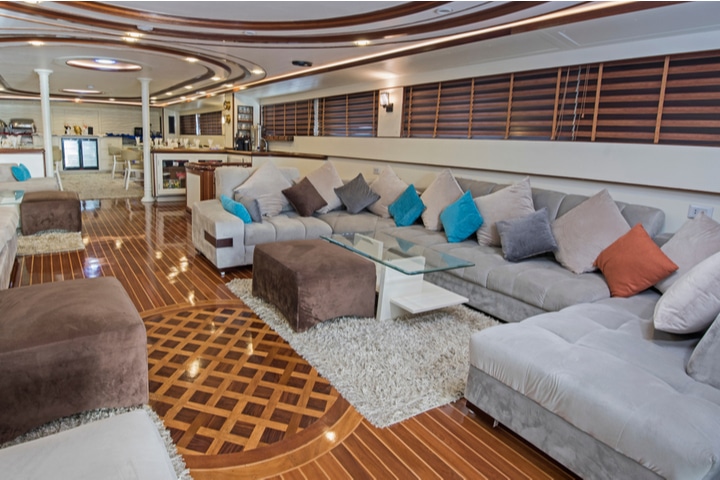
This is perhaps the best measure of a yacht. If the vessel offers accommodations, a galley , a head , and is luxurious in its presentation, it’s most likely a yacht.
That said, there are lots of center console fishing boats and towboats that are pretty nicely equipped these days and they wouldn’t be called a yacht.
All yachts are boats, but not all boats are yachts—and the lines are blurry. The word yacht elicits images of posh seafaring experiences while a boat evokes ideas of fun and perhaps work. Do some research to learn what size and type of boat or yacht is best for you .
To a degree, the point at which a boat becomes a yacht is in the ear of the beholder but if you focus on size, amenities, and the type of use, you’ll be able to discern the difference. Then all that remains is to find a way to spend time and have fun on any kind of vessel.
Browse All Available Boat & Yacht Rentals Across the Globe

Zuzana Prochazka is an award-winning freelance journalist and photographer with regular contributions to more than a dozen sailing and powerboating magazines and online publications including Southern Boating, SEA, Latitudes & Attitudes and SAIL. She is SAIL magazines Charter Editor and the Executive Director of Boating Writers International. Zuzana serves as judge for SAIL’s Best Boats awards and for Europe’s Best of Boats in Berlin.
A USCG 100 Ton Master, Zuzana founded and manages a flotilla charter organization called Zescapes that takes guests adventure sailing at destinations worldwide.
Zuzana has lived in Europe, Africa and the United States and has traveled extensively in South America, the islands of the South Pacific and Mexico.
Browse by experience

Explore articles

Best Time to Buy a Boat: A Complete Guide
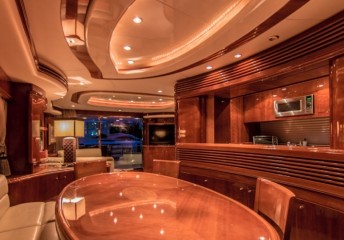
Private boat rentals inspire custom boating experiences

Wakeboarding Basic Tricks

5 Best Beaches in Melbourne, Florida
- Pontoon Boats
- Personal Watercraft
- nauticalknowhow
- Nautical Knots
- Tools and Calculators
Yacht vs Boat: What’s the Difference?
You may be surprised to learn that the difference between a yacht and a typical boat is not as easy to figure out as you’d think. This is thanks to the fact that there’s no specific definition for what a yacht actually is. In general, and as most people commonly use and understand these words, a yacht is a fast, often luxurious vessel used for recreational purposes. A boat, on the other hand, is typically a smaller vessel and it can have many purposes from recreation to fishing to rescue and more.
Let’s get into some of the specific differences between yachts and boats to get a better idea of what each of these admittedly general terms is trying to refer to.
What is a Yacht?
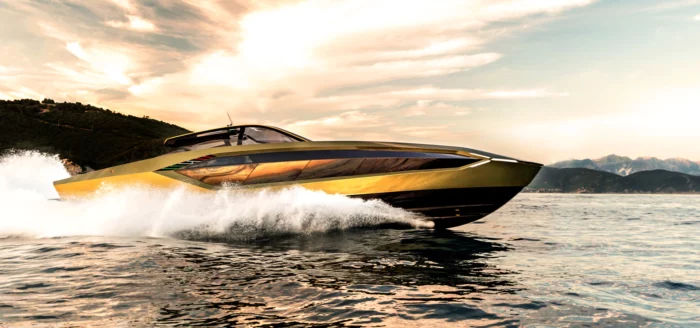
Yacht comes from a Dutch word jaghte , itself from the word jaghtschip which means “fast pirate ship.” That gives you an idea of where people’s heads were at when yachts first came on the scene. These days, the pirate part isn’t really involved but you do tend to expect a yacht to have some speed. Not that these are necessarily speed boats all the time, but there are racing yachts out there that people use exclusively for that purpose.
Because there is no specific definition for the word yacht in modern usage, you have to play it by ear a little bit. It’s one of those words that we all know what it means, even if we don’t have a proper, set in stone definition.
In general, and for most people, a yacht is a large recreational boat, capable of reaching high speeds and noted for its luxury and features. So what does any of that mean?
In terms of size, most people but not all would consider a yacht to be a boat that has reached at least 78 feet. Some people would acknowledge smaller vessels, as low as even 33 feet, as yachts, but this can be hotly debated even among yacht makers and yacht charter companies.
What is a Boat?

One of the oldest words in any language, boat can be traced back through Middle English to Olde English to proto-Germanic to the proto-IndoEuropean word “bheid” where it may have originally meant “to split” or something along those lines. That would have referred to simply splitting or hollowing wood to make a boat. So, by that definition, a boat is incredibly loosely defined.
In modern understanding a yacht is a boat but not all boats are yachts. Consider boat more of an overarching term like automobile while yacht is like an SUV. There are lots of other automobiles and SUV is just one kind.
Usually when people talk about boats today they mean smaller vessels. At some point, large boats become ships, and potentially even a yacht. Smaller boats could be anything from a fishing boat to a jon boat to a sailboat , a bass boat , catamaran , pontoon boat and more. Those boats often have very different forms and functions which allow for a heck of a lot of variety and usage.
Yacht Size vs Boat Size
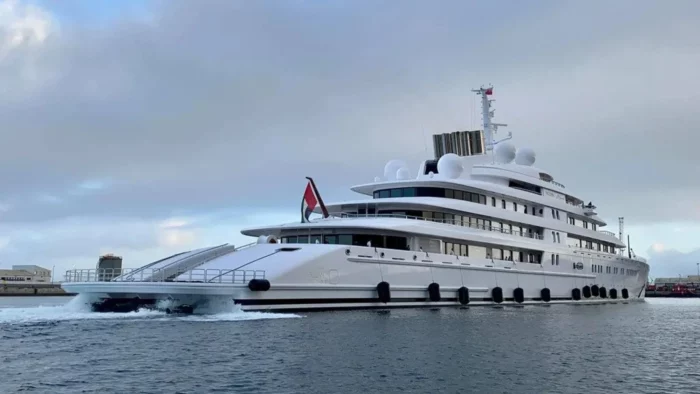
As we mentioned above, people have different opinions about how big a yacht has to be. The bare minimum seems to be at least 33 feet. That said,I have even seen smaller boats called yachts but let’s say, at a minimum, any vessel under 30 feet will always be a boat of some kind and would rarely if ever be properly called a yacht.
Larger boats exist and are not yachts, of course, but these can be sport fishing boats, catamarans, even large pontoons, houseboats and more.
Yachts can start at that low range and get up to incredible sizes which we will touch on in a moment. The largest yachts can get close to 600 feet.
Mega Yachts vs Larger Boats

Once a yacht hits 120 feet people often call it a super yacht. There doesn’t seem to be an easy to find historical reason why 120 feet is the cut off that makes a super yacht. As yachts grew even larger, 200 feet became a sort of milestone for where a superyacht became a mega yacht. And nowadays, with even bigger yachts available, 400 feet is where the cut off often begins for yachts known as gigayachts.
Now, when it comes to large boats, here’s where things get fuzzy. You can find sport fishing boats that are over 120 feet, or sailboats that reach the same length and much bigger. But these are often also called yachts. Sailing yachts, sport fishing yachts. So there’s a line there that boats can straddle even if, under a certain length, the same boats wouldn’t be considered yachts.
Part of the transition from boat to yacht at large sizes comes from the fact that a massive boat is obviously expensive which means more luxury features are likely to be included which means it’s more likely to be considered a yacht.
But large commercial vessels, military and law enforcement vessels, and some search and rescue vessels used by government agencies or private companies can also reach lengths of 60 feet to 100 feet and more and these would obviously never be called yachts. It’s that key feature of being used for recreation that you need to factor in.
Yacht Engines vs Boat Engines
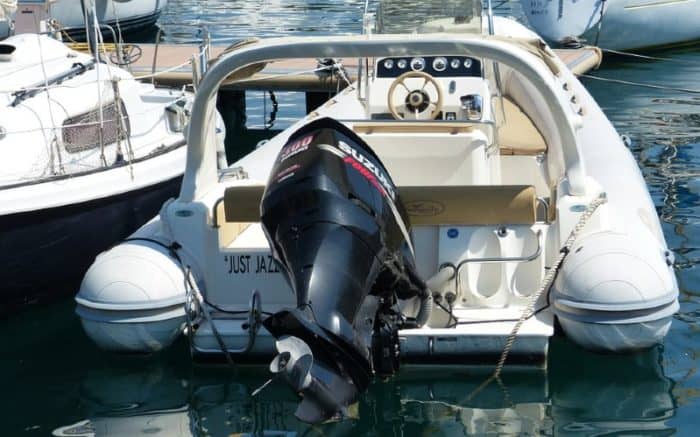
Obviously a sailing yacht won’t factor in here but motor yachts and hybrid yachts have very powerful engines because yachts tend to have a much higher gross tonnage than your average boat of even the same length. Keep in mind that some yachts, especially mega yachts, may have up to seven decks. You need a lot of power to keep that moving. Some of the biggest yachts in the world have a fuel tank capable of holding up to a million liters. That’s going to leave your normal outboard motors in the dust.

Boat Crew vs Yacht Crew

Yacht crews are often found wearing uniforms and have specialized training not just to run the vessel but also to see to the needs of the guests. Since yachts are often characters, the guests on board are like guests at a hotel and treated as such. Large yachts are a lot like a private cruise service.
Boats don’t always even need a crew and if a boat does have a crew it probably means the boat is a commercial vessel of some kind – think of a commercial fishing boat, for instance.
Boat Amenities vs Yacht Amenities

Here’s a place where boats and yachts often part ways significantly. There are some pretty luxurious houseboats and pontoons and cabin cruisers out there to be sure, but when you look at what you can get on a megayacht there’s barely a comparison.
The most expensive yachts have multiple helipads, swimming pools, tender garages that contain things like jet skis, gyms, high tech yacht electronics, massage rooms, bars, movie theaters, mini subs, discos, you name it. These really are like private cruise ships.
Now obviously it’s not fair to compare a 12 foot jon boat to the 600 foot Azzam yacht but these are clearly as different from each other as any two things can be. Yachts are known for their luxury and they can truly push the limits sometimes.
Yacht Locations vs Boat Locations

Smaller boats are obviously more capable of handling coastal and inland waters than any yacht you’re likely to find because that’s what they’re meant for. Yachts are typically, but not always, found in saltwater, usually around vacation destination areas like the Bahamas, the Mediterranean, Florida, tropical islands and so on. Boats are at home anywhere you find water.
There are definitely yachts on inland lakes like the Great Lakes, but they are decidedly less common.
Yacht Price vs Boat Price

Here’s where things get really different. You can get a little fishing boat for a few hundred dollars if you want. The Eclipse yacht cost $1.5 billion. So that’s the range we’re dealing with in terms of yachts vs boats when it comes to cost. If you try to meet in the middle with a 33 foot sport cruiser boat you might pay $200,000. But the average price for a yacht in 2021, and this means a vessel between 56 feet and 79 feet, was $1.1 million.
The Bottom Line
All yachts are boats but not all boats are yachts. In general, a yacht is a larger vessel that is used strictly for recreational purposes. It’s defined by its speed and its luxury and is often at the higher end of the price range. You tend to find yachts in popular vacation spots and they come in at an average price over $1 million.
Boats are generally smaller vessels and can be used for everything from fishing to cruising to commercial, police boats and military purposes. They can be extremely simple and, as a result, also incredibly cheap compared to yachts as well.
My grandfather first took me fishing when I was too young to actually hold up a rod on my own. As an avid camper, hiker, and nature enthusiast I'm always looking for a new adventure.
Categories : Boats , Yachts
Leave a Reply Cancel reply
Your email address will not be published. Required fields are marked *
Save my name, email, and website in this browser for the next time I comment.
More in Boats
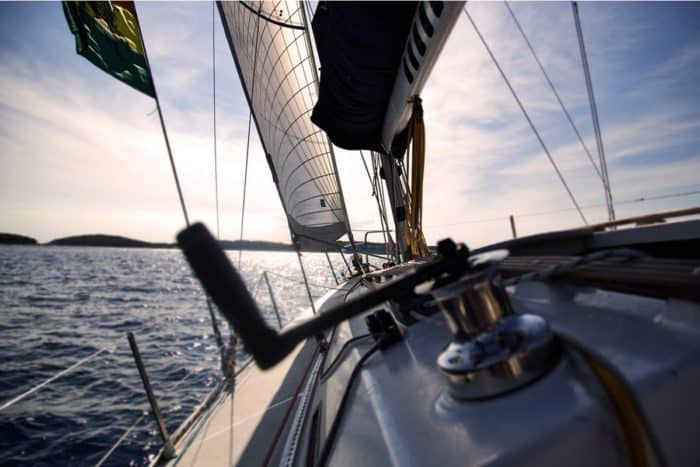
What Is A Gunwale?

131 of the Best Hawaiian Boat Names
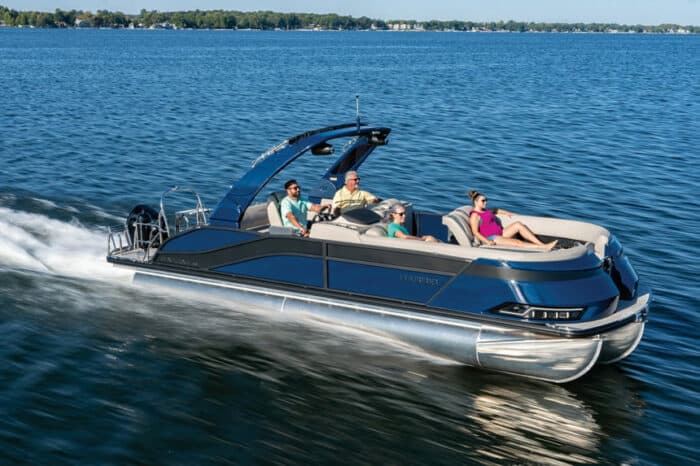
167 Patriotic Boat Names

The 138 Best Boat Names for Dog Lovers

The People’s Poncho Review and Ratings

Oru Lake Kayak Review

About Boatsafe
Established in 1998, BoatSafe is your independent guide into the world of boating, fishing, and watersports. We provide expert insights and detailed guides to help you find products tailored to your needs and budget.
Contact Boatsafe
- Address: 4021 West Walnut Street. Rogers, AR 72756
- Phone: (479)339-4795
- Email: [email protected]
Site Navigation
- How We Test
- Corrections Policy
- Privacy Policy
- Terms & Conditions
- Editorial Policy
- Affiliate Disclosure
Our Reviews
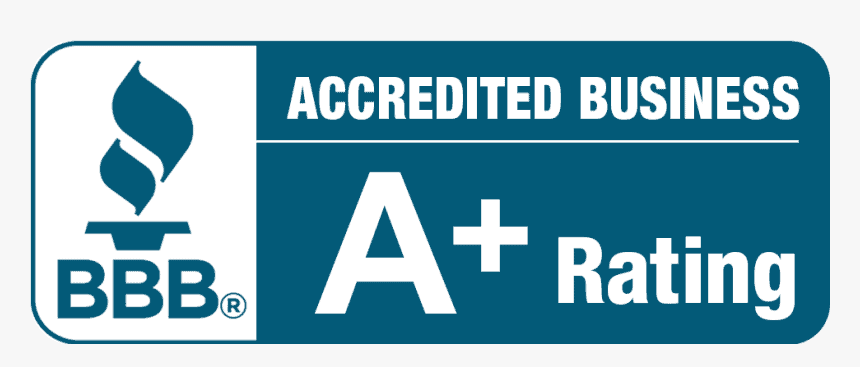
All content is © Copyright 2024. All rights reserved.

Yacht vs. Houseboat — What's the Difference?
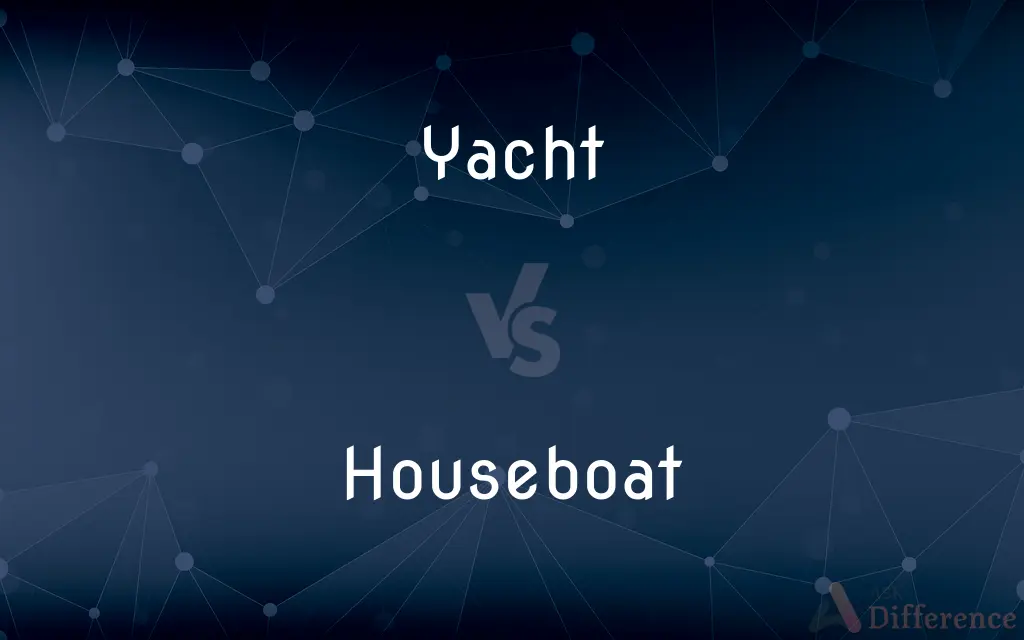
Difference Between Yacht and Houseboat
Compare with definitions, share your discovery.

Popular Comparisons

Trending Comparisons

New Comparisons

Trending Terms


The Difference Between a Boat and a Yacht: Let’s Get to the Bottom of it
If you are not familiar with the world of boating, then you may find yourself wondering, “What is the difference between a Boat and a Yacht?”
By definition, a boat is “a vessel for transport by water”. So, in fact, any size vessel can be called a boat. However, a boat is better defined as a “small watercraft propelled by paddles, oars, sail, or motor”.
A Yacht, however, refers to a larger vessel, used primarily for luxury and comfort. These vessels tend to be larger and boast a number of facilities that make them ‘fancier’ than a boat.
To better compare the difference between a Yacht and a boat, let’s take a look at 4 differences between the two.

The Size of a Yacht vs Boat
This is the easiest way to identify the difference between the two.
There will be some debate on this topic, but a boat is generally any vessel under 30-40ft / 9-12m. Therefore, any vessel over 40ft / 12m can be considered a yacht.
Whether it is a sailing yacht or a motor yacht, the identification is still the same.
Use/Purpose
Another difference between a boat and a yacht is that a boat is generally used for recreational activities such as fishing, water sports, and transporting people.
So, a boat can be anything from a small dinghy to a jet ski, or even a small tender used for fishing. They are usually designed with a specific purpose in mind.
The design of a boat is usually simplistic and done in a way that best fulfills the activity.
A Yacht, on the other hand, is designed for cruising, luxury, and comfort.
A Yacht is designed to be a version of a floating hotel. The main purpose is to cruise comfortably between locations with all the facilities to live onboard in comfort and style.

The Different Features of a Boat and a Yacht
A boat is usually not big enough to live on. However, some smaller tenders up to the 30ft / 9m range can have a small cabin inside which might contain a small toilet and bed.
Boats are generally small and nimble.
When it comes to a Yacht, you have the luxuries and comfort of a hotel on water.
On board a Yacht, you may find cabins (bedrooms), a galley (kitchen), saloons (lounges), and outdoor areas for entertainment. As the size goes up, the facilities get bigger and better.
A boat can either be motorized or non-motorized. A non-motorized boat requires manpower and may move using paddles, oars, or sails.
The motors of a boat tend to be small, but in relation to the size and weight of the vessel, some are able to move fast.
A yacht, however, has larger engines designed for increased power and longer distances. Yachts are designed to have the ability to cover long passages and even cross oceans.
Final Thoughts
There are no hard and fast rules on a boat vs yacht, but these simple distinctions might help you next time you’re unsure of what to call a vessel.
If you are interested in discovering more about boats, check out my post on Motor Yacht vs Sailboat: 7 fundamental differences.

Frequently Asked Questions
At what point does a boat become a yacht.
There is no exact number to answer this question. However, around 30-40ft / 9-12m is the point at which a boat becomes a yacht.
What makes a Yacht not a Boat?
This question can create confusion, as a boat by definition is a vessel for transport by water. So, a Yacht is a boat. A yacht is just a specific category of boat that is larger than 30-40ft / 9-12m.
Can a Boat be a Yacht?
A boat can be a yacht. However, not all boats can be yachts. In order to be classified as a yacht, the boat would need to be over 30-40ft / 9-12m.
Is a 40ft Boat a Yacht?
Yes, boats over the 30-40ft / 9-12m range are classified as yachts.

Hi, my name is Lisa, a Chief Stewardess in the yachting industry with 10 years of experience, as well as 8 years of hospitality experience prior to that. Being in the yachting industry has been a whirlwind of adventure, growth, challenges and some of the best experiences of my life, and I am excited to share my knowledge and experiences with all of you.

Yacht vs. Boat | What’s The Difference?
So, we have boats and yachts. At first glance, they both float on water and seem like a great way to spend a sunny day. But look a little closer, and they begin to show their true colors. Think of boats as the regular bicycles of the sea world: they’re handy, straightforward, and get the job done.
Great for short rides or quick tasks. On the other hand, yachts are like those luxury cars you see in movies. More significant, flashier, and packed with all sorts of fancy stuff. They’re for those who love comfort and style on their sea adventures. While both have charm, they serve different purposes and offer unique experiences. Dive in with us as we explore the watery world of yacht vs. boat !

Overview of a Yacht
A yacht is designed primarily for leisure and recreational use, distinguishing it from working vessels like fishing boats or cargo ships. While yachts can be sailed or motor-driven, they are commonly associated with luxury, comfort, and prestige.
What Size Boat is Considered a Yacht?
The classification of yacht vs. boat is more about design and purpose than strict size parameters. However, in general terms, 30 feet (about 9 meters) and longer boats are called yachts.
- Super Yachts : Typically, vessels over 79 feet (24 meters) fall into this category.
- Mega Yachts : These are often over 164 feet (50 meters) and represent the pinnacle of luxury and size in yachting.
Commercial Purposes of Yachts
While yachts are primarily associated with personal leisure, they can also serve commercial purposes:
- Charter Yachts: Many yacht owners lease their vessels as charter yachts, providing vacationers with luxury experiences on the water. Such charters can range from day trips to weeks-long voyages.
- Yacht Races & Events : Yachts, especially sailing ones, participate in races and regattas, which can attract sponsorship and media attention.
- Training & Certification : Larger yachts requiring professional crew leads to commercial ventures offering maritime training, certification, and placement services.
Overview of a Boat
A boat is a watercraft of various sizes and types, designed to float or plane to provide passage across water. Using primarily for recreation, transportation, and specific tasks, boats serve as invaluable tools and leisure companions worldwide. Here’s a deeper look into what boats encompass:
Size and Types:
While there’s no strict demarcation on size, boats tend to be smaller than yachts, often under 30 feet (around 9 meters) in length. Boats come in various designs and serve multiple purposes:
- Fishing Boats : Designed primarily for angling activities, they often have storage, bait wells, and rod holders.
- Sailboats : Relying on sails for propulsion, they come in many varieties, from single-sailed dinghies to multi-mast schooners.
- Speedboats : Built for speed and agility, these are often used for racing, watersports, or leisure cruising.
- Rowboats : Powered by human effort using oars, they’re commonly found in calm lakes and rivers.
- Kayaks & Canoes : Narrow watercraft primarily used in rivers, lakes, and coastal areas.
Usage and Function:
Boats serve a myriad of functions:
- Recreation : From tranquil fishing trips to adrenaline-filled watersports, boats offer various recreational activities.
- Transport : Especially in archipelagic or coastal regions, boats provide essential transportation between islands or short distances.
- Occupation : Many rely on boats for their livelihood, from fishing to tour guiding.
- Rescue : Lifeboats and other specialized vessels play critical roles in rescue operations in water bodies.
- Sport : Boating competitions, from kayak races to sailboat regattas, are famous worldwide.
Sea Vessels Explored: Difference Between The Boat vs. Yacht
1. size: the defining dimension.
Boat: Boats are the compact vehicles of the maritime domain. They typically measure under 30 feet, providing just enough space for basic amenities and functionalities. Yacht: Contrasting starkly with boats, yachts are the giants of the seas. Starting from 30 feet, they often venture into the territory of super-yachts that stretch beyond 200 feet.
2. Propulsion Operations: The Power that Propels
Boat: How do boats move? The answers are as diverse as the boats themselves. Some rely on human power, like rowboats with oars. Others harness the wind using sails. Many modern boats, especially those used for recreation, utilize outboard motors.
Yacht: Yachts present a more complex picture when it comes to movement. Their larger structure necessitates sophisticated propulsion systems.
3. Use: Function Meets Passion
Boat: A boat’s purpose is as varied as its type. Need to fish? Boats have you covered. They also serve specific tasks, like towing or participating in water sports, ensuring a boat for almost every water-bound need.
Yacht: Yachts are less about function and more about experience. Imagine cruising through azure waters, anchoring beside secluded beaches, or hosting lavish parties amidst the ocean’s vastness.
4. Luxury and Comfort: The Glamour Quotient
Boat: Boats are built for a purpose. Their designs are straightforward, keeping in mind the core function. While some modern boats incorporate creature comforts like cushioned seating or basic entertainment systems, they’re not about luxury.
Yacht: Luxury is the essence of a yacht. It’s not just a vessel; it’s a floating piece of art equipped with modern luxuries. Think of gourmet kitchens, state-of-the-art entertainment hubs, jacuzzis with ocean views, and staterooms rivaling five-star hotel suites. Larger yachts may even feature helipads, cinemas, and gyms, making them floating mansions.
6. Price: The Investment Spectrum
The cost comparison of Yacht vs. Boat is as:
Navigating the Importance of Distinction
Why is it so essential to understand these differences? Here are some reasons:
Investment Implications: Discerning between a boat and a yacht helps potential buyers gauge their investment, from purchase and docking fees to long-term maintenance.
Operational Skills: Larger vessels like yachts demand a more profound understanding of maritime navigation. Some regions even mandate professional licenses or crew for yachts, reflecting their complexity.
Matching Maritime Ambitions: Identifying the right vessel type ensures that one’s nautical aspirations — fishing, luxury cruising, or weekend family outings — are adequately met.
Boats vs. Yachts: Insights from the Crew’s Perspective.
For Boat:
Yachts vs. Boats: A Nautical Choice
Deciding between a yacht and a boat isn’t just picking a watercraft; it’s about embracing distinct water-bound lifestyles. This choice goes beyond mere selection—it dives deep into the unique vibes, moods, and values that each vessel radiates—both present enchanting seafaring experiences tailored to individual desires and dreams.
Yachts are synonymous with opulence, style, and the magnetic charm of the open ocean. They offer expansive spaces and state-of-the-art facilities and are perfect for hosting grand get-togethers. When a yacht anchors, it silently broadcasts its owner’s love for deluxe experiences and refined living.
On the flip side, boats resonate with liberty, straightforwardness, and closer communion with aquatic wonders. They’re for those who love the undiluted thrill of water escapades, be it a serene fishing day on a secluded lake or meandering through a winding river.
Yacht vs. boat beckons with the charm of open waters, but they’re designed for different adventures and needs. Think of boats as your go-to for practical tasks or quick getaways, while yachts are all about diving into luxury, relaxation, and unforgettable sea escapades. So when you see a vessel cutting through the waves next time, you’ll know if it’s a simple boat doing its thing or a grand yacht making a statement.
FAQ’s
Q: What Is the Difference Between a Yacht and a Boat?
A: A yacht is a more extensive and more costly form of watercraft than a standard boat. It is frequently utilized for luxury reasons, such as relaxing or sailing around the Mediterranean. In contrast, a boat is a broader phrase that can apply to any watercraft.
Q: When does a boat become a yacht?
A: Yachts are often more significant than other forms of leisure boats. However, there is no hard and fast line between categories. Nonetheless, the widely accepted point at which a boat might begin to qualify as a yacht is roughly 35 feet, but they can easily be more extended.
Q: Is every boat a yacht?
A: While there is no legal criterion for a boat to become a yacht, anything longer than 40 feet might be termed a yacht, furthermore, you will most likely enter the “mega-yacht” or “superyacht” area when you increase in size.
Leave a Comment Cancel reply
Save my name, email, and website in this browser for the next time I comment.

The Key Differences Between a Yacht and a Boat | Yacht vs Boat
Olivia benjamin.
- June 20, 2023

It’s a common misconception to assume that there is no difference between a yacht and a boat, but there are notable differences between these two types of watercraft. Yachts are generally larger and more luxurious than boats, typically smaller and designed for recreational activities such as fishing or water sports.
While yachts and boats serve as leisure vessels on the water, yachts often boast additional amenities like air conditioning, multiple bedrooms, and even hot tubs. Conversely, boats tend to have simpler features, such as a small cabin or storage space for fishing equipment.
Gaining a deeper understanding of these differences can assist you in determining whether to choose a yacht or a boat based on your unique needs and preferences. So, let’s dive deeper into the distinctions between these two types of vessels.
What is a Yacht and What is a Boat?
Boats and yachts are two terms that are often used interchangeably, but there are distinct differences between them. Let’s examine the differences between boats and yachts.
What is a Yacht?
You might think of a yacht as a luxurious vessel often used for leisure activities, like sailing the high seas or throwing lavish parties on board.
Yachts are typically larger than boats and have amenities such as multiple cabins, bathrooms, kitchens, and entertainment areas. They’re designed for comfort and style rather than speed or efficiency.
However, it’s important to note that not all yachts are the same. Some may be motorized, while others require sails to move through the water.
Moreover, there are several types of yachts, including racing yachts, cruising yachts, and mega yachts, with sizes ranging from 33 to over 160 feet. Each type caters to specific preferences and requirements, ensuring a tailored yachting experience.
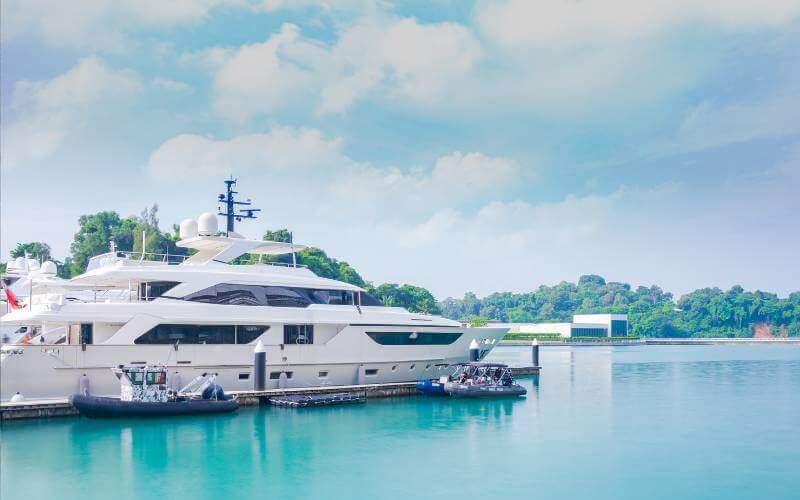
What is a Boat?
A boat is a watercraft primarily designed to float, move, and navigate on water. It is a generic term that refers to a wide range of vessels used for various purposes such as recreation, transportation, military, commercial use, or fishing.
Boats come in different sizes, designs, and types, each serving a specific need. Small boats like kayaks and canoes are used for recreational purposes, while larger boats like tugboats serve commercial purposes.
Whether used for pleasure or work, boats offer great maneuverability. They can navigate in shallow waters and tight spaces and come equipped with navigation and other systems.

Boat vs Yacht | What is the difference between a Yacht and a Boat?
Do you want to know the differences between yachts and boats? Well, there are several key points to consider.
A boat is a generic term used to refer to any small watercraft. At the same time, a yacht is a specific type of boat often associated with luxury and recreational purposes. Many differences exist between yachts and boats, including the use, size, construction of these vessels, and many more.
Let’s explore these differences in detail to help you understand the unique qualities of each type of watercraft.
Difference in Size
Yachts are typically larger than boats, often measuring over 40 feet long. While boats come in various sizes, they often range from around 20-30 feet in length.
Boats are usually smaller and built for leisurely activities like fishing or cruising on lakes and rivers. On the other hand, yachts are designed for luxurious living at sea and are often equipped with multiple cabins, bathrooms, entertainment areas, and even swimming pools.
The size difference between yachts and boats also affects their handling of the water. Due to their large size and complex systems, yachts require experienced crews to operate them. Boats, on the other hand, can be easily handled by anyone with basic boating knowledge.
Difference in Use
While both vessels are designed for water travel but serve very different purposes, boats are typically smaller vessels used for recreational activities such as fishing, water sports, and short trips along the coast. They’re also commonly used for transportation in areas with many waterways.
Yachts, on the other hand, are much larger and more luxurious than most boats. They’re typically owned by wealthy individuals or companies and used for leisurely cruising or entertaining guests. Some yachts can even be chartered for special events such as weddings or corporate retreats.
Difference in Technology
While many boats rely on traditional engines or rowing, yachts often incorporate cutting-edge navigation, communication, and entertainment technology.
For example, some luxury yachts have state-of-the-art autopilot, radar and GPS systems that easily navigate even the most treacherous waters. Additionally, many yachts are equipped with satellite phones and other communication devices that allow passengers to stay connected no matter where they are.
Conversely, boats have basic technology geared towards recreational purposes, like fish finders or depth sounders. Older boats may still use traditional analog instruments for compass bearing and navigation.
Regardless of size or purpose, one thing is clear – technology plays a major role in differentiating between a yacht and a boat.
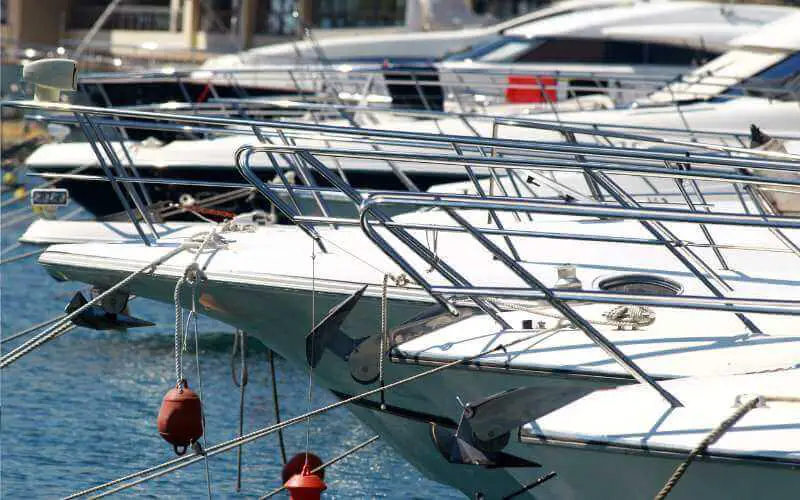
Differences in Power and Propulsion
When it comes to power and propulsion, yachts and boats have some key differences. Yachts are often equipped with larger, inboard engines designed for speed and endurance. In contrast, boats may have outboard motors that are smaller and better suited for recreational purposes.
Another key difference relates to the type of transmission used. Yachts often rely on multi-speed transmissions that allow the engine to operate at various speeds. Boats, on the other hand, may have simpler transmission systems that are designed for a lower level of performance.
The type of propulsion used is also important to consider. Yachts may be propelled by jets, controllable pitch propellers or other high-tech means, enabling them to perform well in various conditions. Boats typically rely on simpler propellers unsuited to more demanding environments.
Difference in Price
When it comes to price, yachts and boats are on opposite ends of the spectrum. Boats, being smaller and typically used for recreational purposes, can range from a few thousand dollars to a few hundred thousand dollars.
Yachts, on the other hand, are significantly more expensive. These vessels are often larger and more luxurious, costing several million to hundreds of millions of dollars.
The cost of owning a yacht goes beyond just the initial purchase price. Yachts require significant upkeep, including maintenance, insurance, and docking fees. However, yacht owners are often willing to pay high costs for the prestige and luxury of owning such vessels.
The Difference in Luxury and Comfort
Luxurious yachts have everything from plush interiors with high-end finishes to state-of-the-art entertainment systems. Many yachts also come equipped with luxurious bedrooms, bathrooms, and gourmet kitchens.
In addition to these features, yachts offer expansive decks and outdoor spaces for entertaining guests or simply enjoying the sun and sea breeze.
When it comes to luxury and comfort, there really is no comparison between a yacht and a boat. While boats may be functional for certain activities, such as fishing or water sports, they offer a different level of extravagance than you’ll find onboard a yacht.

Frequently Asked Questions
What is the cost difference between purchasing a yacht and a boat.
Before you set sail, remember, a yacht is not just a bigger boat. The difference between purchasing a yacht and a boat can be significant, with yachts typically costing millions while boats range from thousands to hundreds of thousands.
Are there any legal requirements for operating a yacht versus a boat?
To operate a yacht, you may need a captain’s license and have to follow specific regulations depending on the size of your vessel. For boats, requirements vary by state and type of boat but are generally less strict.
How does the size of a yacht compare to the size of a boat?
Yachts are generally larger than typical boats, ranging from 33 feet to over 160 feet in length. However, the size distinction between a yacht and a boat needs to be clearly defined and can vary depending on personal perception.
Are there any specific maintenance requirements for a yacht that differ from those of a boat?
Yachts require meticulous maintenance to ensure they remain seaworthy. This includes regular inspections, cleaning, and repairs. These tasks are more complex and costly than those typically required for boats but crucial for the safety of all onboard.
What is the largest yacht in the world?
As of 2023, the largest yacht in the world is the SOMNIO , measuring 222 meters (728 feet) in length. The yacht is under construction and due for launch in mid-2024.
A yacht can be likened to a floating mansion, replete with lavish amenities and luxurious features, often owned by affluent individuals who relish time at sea. These vessels boast multiple decks, spacious cabins, and even swimming pools.
In contrast, boats come in various shapes and sizes, ranging from small dinghies to large commercial tugboats. While some boats offer basic amenities like a small cabin or restroom, they cannot compete with the luxury of a yacht.
The primary distinction between a yacht and a boat lies in luxury and comfort. Yachts epitomize extravagance, providing amenities akin to a high-end hotel suite, while boats prioritize practicality and functionality.
Ultimately, choosing between a yacht and a boat depends on personal preferences and intended use.
Boat Collisions: How to Avoid Collisions with Another Boat
Boating can be a fun and relaxing activity that many individuals enjoy. Whether cruising along the coastline, fishing with friends,
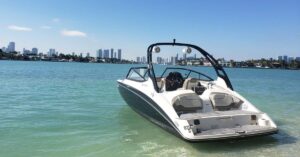
What is a Jet Boat? Propulsion System, Types, Pros and Cons
Jet boats are thrilling, high-speed watercraft making waves in the boating industry. Unlike conventional boats, a jet boat uses powerful

How to Steer a Boat: Mastering the Art of Boat Steering
If you’re ready to embark on a boating adventure and take hold of the helm, it’s time to dive into
Workshop Insider Newsletter
Be a workshop insider get our latest collection of news and announcements delivered to your inbox..., latest articles.
- September 12, 2023
The Ultimate Guide to Pipeliner Welding Hoods: Features, Benefits, Buying Guide, and Best Practices
- Welding Helmets Buying Guides
- September 11, 2023
- September 10, 2023
J-B Weld Removal: How to Remove JB Weld from Metal, Plastic, Skin, and More!
- Mechanical Engineering , Welding Technology
- August 19, 2023
- August 17, 2023
What are Bellows on a Boat: Everything You Need to Know
- August 16, 2023

- Privacy Policy
- Terms of Use
- Affiliate Disclosure

What’s the Difference Between a Boat, Yacht & Ship?
Whether you are a brand new sailor or just wanting to brush up on some terms, it is essential to know what to call a particular watercraft if you’re going to fit in while you’re at the docks or out on the water. There are many nuances and subtle differences between water vessel types, but below are some of the main differences.
In general, yachts are either sailing or motor vessels used for pleasure. Yachts are often luxurious and equipped with an overnight cabin. Boats can be either propelled sail or a motor and come in varying sizes. On the other hand, ships are usually motor-powered and much larger than boats.
Some of the differences between watercraft types can be a little fuzzy, but once you grasp the main differences between them, it becomes relatively easy to tell them apart. If you have no previous knowledge of watercraft, you are likely very confused about what defines a yacht, boat, and ship, so I’ll try to clarify any confusion you might have in the next few sections.
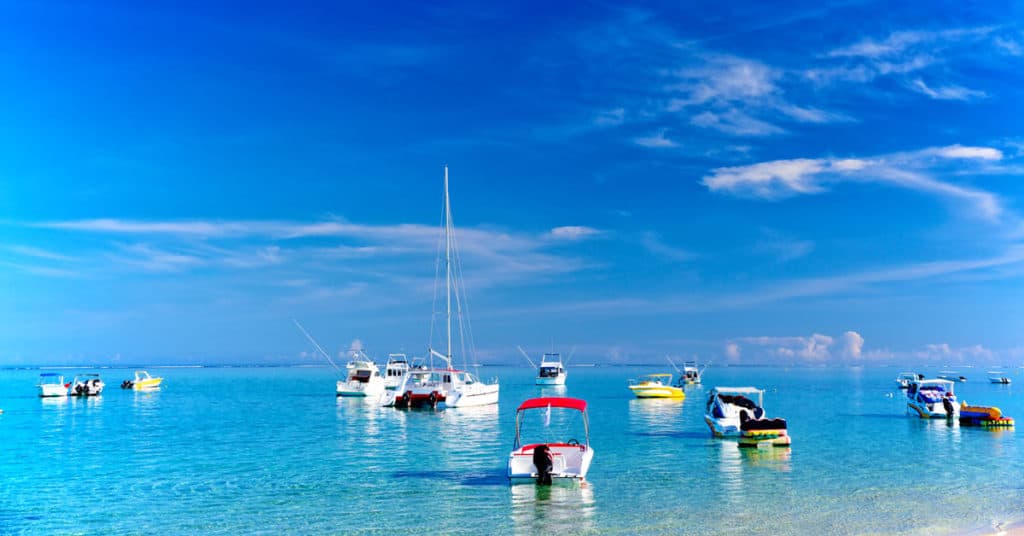
Similarities and Differences Between Boats, Yachts, and Ships
The many bodies of water all over the world are home to an extensive collection of different watercraft. There are so many shapes and sizes that they come in that it is nearly impossible to fit every single one into a specific classification.
However, in the following table, I did my best to loosely define ships, yachts, and boats so that it is easy to see the differences between the types of watercraft.
As I mentioned earlier, it is impossible to fit EVERY SINGLE water vessel into a particular category, so there are tons of exceptions out there. In addition to the exceptions, different organizations, laws, and people classify types of boats slightly differently.
There is no universally accepted definition for ships, boats, and yachts, but instead many different sets of rules and regulations. In this article, I have tried my best to use the most commonly accepted definitions for each watercraft type.
Now that we’ve gone over some of the main differences and similarities between boats, ships, and yachts, let’s take a look at each type of vessel individually and look at their most prominent characteristics and attributes.
What Exactly is a Boat?
Boats come in a vast array of sizes and shapes. To many people, the term “boat” simply refers to nearly any watercraft, but there are actually a few restrictions and defining characteristics that all boats have. So let’s just get right into it and take a quick look at what exactly qualifies a vessel as a boat.
Overall Size of Boats
As I said before, there is a massive catalog of different types of boats, and they come in a variety of sizes. There are huge boats that hold lots of cargo or people, and then there are smaller ones that barely can stay afloat with a single person on board.
Typically, boats are defined as watercraft that are less than 197 feet long. However, most boats you are likely to encounter on the water are usually around 30 feet long.
General Price Range of Boats
Again, it is hard to accurately give a price range for all boats because they come in so many different sizes, styles, and types, but most modern boats seem to fall in the $1,500 to $100,000 range.
Small Jon boats can cost even less than $1,500, while large sailboats and houseboats can cost well above $100,000.
Most Common Uses of Boats
Boats are used all over the world for a variety of different reasons and to do many tasks. Many types of boats serve a wide range of uses, but most are primarily used as a residence, for pleasure, or commercially.
Some of the most popular types of boats, such as sailboats, bowriders, and dinghies, are commonly used for enjoyment, fishing, racing, or other pleasurable activities. There are also many types of houseboats used as residences and commercial boats used for chartering or moving goods or people.
Propulsion Method of Boats
Due to the wide variety of boats, you are likely to find boats propelled by almost every propulsion method imaginable. Some of the more popular propulsion methods for boats to use are man-power, wind power, and motor power.
Boats on the smaller end often use the power of the people on board to row or paddle, while larger boats rely on sails or powerful motors attached to the stern. Many boats use more than one propulsion method, either together or with one of them as a backup.
What Exactly is a Yacht?
Yachts have many of the same attributes as boats, but their quality, size, and luxury really set them apart. When someone says “yacht,” many people imagine watercraft that are SUPER LARGE, and while there are lots of massive yachts, many smaller boats also qualify as yachts, which might surprise you.
Overall Size of Yachts
There are many different sized yachts, and the rules regarding how big they have to be are not very strict. In general, luxury watercraft greater than 33 feet in length are considered yachts. However, boats smaller than 33 feet are sometimes called yachts if they are exceptionally luxurious and elegant.
There is no upper limit to how large a yacht can be. Yachts longer than 100 feet are often referred to as mega yachts, and ones over 150 feet long called are super yachts.
General Price Range of Yachts
Because the very definition of a yacht requires it to be very luxurious, they often come with quite a price tag as a result. There is quite a range of different price points for yachts, ranging from $250,000 to $50,000,000 and beyond.
Most Common Uses of Yachts
Yachts, because they are so expensive to maintain and purchase, are primarily used for pleasure purposes. Day trips out on the water are typical for yachts, although they often have overnight cabins, so longer excursions are popular.
Chartered yachts are also very popular, which bridges the gap between commercial and pleasure. Although, when you are on a chartered yacht, it is usually for the sole purpose of having a great time and enjoying yourself.
Propulsion Method of Yachts
Because yachts are considered very luxurious and often so large, they are usually solely propelling using motor power. Even if a yacht is on the smaller end of the spectrum, they often only use a motor as a means of driving the craft through the water.
However, many large sailing yachts out there use sails and the wind to propel the vessel. So while the large majority of yachts use motors, keep in mind that some large and luxurious sailboats can be considered yachts.
What Exactly is a Ship?
Throughout history, large ships have been a helpful tool for many civilizations and have allowed them to transport goods and explore places beyond their homes. In modern times, ships are quite common and are used for a variety of different reasons.
Overall Size of Ships
One of the primary characteristics of ships that set them apart from boats is their size. Ships, especially in modern times, are often MASSIVE and are restricted to navigating only extensive waterways.
Vessels greater than or equal to 197 feet long are often considered ships. However, most ships today are huge and often fall in the 1,000-foot range or larger.
General Price Range of Ships
Most individuals will never own a ship due to their extreme maintenance and the cost of purchasing one. While many smaller ships are far less expensive, most modern ships cost anywhere between $50 and $500 million.
Large and luxurious cruise ships can even cost upwards of $1 billion to construct, and that’s not even taking into account staff, maintenance, and other costs.
Most Common Uses of Ships
Ships perform many different duties throughout the world, but usually, they are used to transport passengers or goods over long distances. In addition, they are also often used by military, scientists, fishers, and a plethora of other professions and people. They are also often used for pleasure purposes, in the form of passenger cruise ships.
Overall, ships encompass a large selection of vessels that perform many different duties.
Propulsion Method of Ships
Due to their large size, most modern ships are propelled using motors. However, even though ships are equipped with massive motors, they are still pretty slow and often move at around 20 knots per hour, although some move much quicker.
While most, if not all, ships today use motors to propel themselves through the water, this was not always the case. Before motors were around, many civilizations used ships for military, exploration, transportation, shipping, and many other uses. During these times, ships were powered primarily by man and wind power. Even today, you can occasionally find a sail-powered ship, though they are quite rare.
James Gerard
Hi, I'm James! I started sailing at a very early age here in the UK, and have enjoyed so many opportunities to sail all over the world. I created this website to share the many sailing tips I've leaned over the years, so that you can also discover the joy of sailing with safety and confidence.
Recent Posts
How to Predict Wind Direction & Speed from a Surface Pressure Chart
Learning how to read a surface pressure chart will allow you to predict the wind speed and direction based on the weather chart. This will help you in planning your next sailing trip.
What Does a Black & Yellow Buoy Mean? (Cardinal Marks Explained)
If you see a black and yellow buoy while you're sailing, don't ignore it. Cardinal Marks are there to help you avoid hidden hazards in the water. This helpful article will help you to identify a...
- Organizations
- Planning & Activities
- Product & Services
- Structure & Systems
- Career & Education
- Entertainment
- Fashion & Beauty
- Political Institutions
- SmartPhones
- Protocols & Formats
- Communication
- Web Applications
- Household Equipments
- Career and Certifications
- Diet & Fitness
- Mathematics & Statistics
- Processed Foods
- Vegetables & Fruits
Difference Between Yacht and Boat
• Categorized under Objects | Difference Between Yacht and Boat

English is a language that is choc full of words. In fact, English has one of the largest vocabularies of any of the world’s languages. While this makes it a rich and fascinating language, it can also make learning English somewhat confusing.
Take for instance the amount of vocabulary that we have to differentiate between marine vessels. What exactly is the difference between a yacht and a boat?
English speakers generally use the word boat to refer to a sea vessel that is reasonably small and not luxurious. The term can refer to a vessel that is motorized or not motorized and either used for work, such as in the case of a fisherman or water police, or for recreational purposes such as weekend fishing or relaxing.
A boat can either be a dinghy, row boat, fishing boat, or sailing boat and they can be quite large, but are usually more practical than luxurious.
A yacht is normally a larger and much more luxurious sea vessel than a boat. Tell the owner of a yacht that they have a boat and they are likely to take offense. Yachts are not generally used for commercial purposes, but are luxury recreational vessels. They can either be sailing yachts or power boat yachts.
There are a couple of different styles of yacht that can be differentiated: a regular yacht starts at about 34 feet, a mega yacht is more than 100 feet and a super yacht is any yacht that is longer than 200 feet.
A ship is a very large sea vessel that is generally used for commercial purposes such as shipping cargo between ports around the world or a cruise ship or passenger ship for transporting people.
There is a lot of different vocabulary used to describe different types of sea going vessels, but if you understand the essential differences between a boat, ship and yacht then you are unlikely to make many errors. Boat tends to be a broader term for sea vessels than yachts, which are more specifically used as a luxury pastime.
Summary: 1.Boats can be used for commercial or recreational purposes 2.Yachts are generally only recreational 3.Boats are generally small 4.Yachts can be any size up to more than 200 feet long 5.Ships are large sea vessels used for commercial purposes 6.Boats and yachts can either be motorized or not motorized
- Recent Posts
- Difference Between Governor and Senator - November 14, 2009
- Difference Between Immigration and Migration - November 14, 2009
- Difference Between Who and Whom - November 13, 2009
Sharing is caring!
Search DifferenceBetween.net :
- Difference Between Boats and Ships
- Difference Between Port and Harbor
- Difference Between Aluminum and Fiberglass Boats
- Difference Between MPH and Knot
- Difference Between Inboard and Outboard Motors
Cite APA 7 , R. (2009, November 3). Difference Between Yacht and Boat. Difference Between Similar Terms and Objects. http://www.differencebetween.net/object/difference-between-yacht-and-boat/. MLA 8 , Rachel. "Difference Between Yacht and Boat." Difference Between Similar Terms and Objects, 3 November, 2009, http://www.differencebetween.net/object/difference-between-yacht-and-boat/.
US Coast Guard conciders a vessel over 26′ with a cabin to be a yacht.
All Boats for privat sporting are named “YACHT”. For me is a Yacht a sportboat with a closed cabin on board. per exemple : A safeboat on a liner is more long than 34 Feet but it is always a “BOAT” because its a public and commercial thing. A “Yacht” is a privat and luxury sportboat for a privat person !
Leave a Response
Name ( required )
Email ( required )
Please note: comment moderation is enabled and may delay your comment. There is no need to resubmit your comment.
Notify me of followup comments via e-mail
Written by : Rachel. and updated on 2009, November 3 Articles on DifferenceBetween.net are general information, and are not intended to substitute for professional advice. The information is "AS IS", "WITH ALL FAULTS". User assumes all risk of use, damage, or injury. You agree that we have no liability for any damages.
Advertisments
More in 'objects'.
- Difference Between CNG And LPG
- Difference Between Classical and Acoustic Guitar
- Difference Between Cat5e and Cat6
- Difference Between Cow Milk And Goat Milk
- Difference Between CPAP and BIPAP
Top Difference Betweens
Get new comparisons in your inbox:, most emailed comparisons, editor's picks.
- Difference Between MAC and IP Address
- Difference Between Platinum and White Gold
- Difference Between Civil and Criminal Law
- Difference Between GRE and GMAT
- Difference Between Immigrants and Refugees
- Difference Between DNS and DHCP
- Difference Between Computer Engineering and Computer Science
- Difference Between Men and Women
- Difference Between Book value and Market value
- Difference Between Red and White wine
- Difference Between Depreciation and Amortization
- Difference Between Bank and Credit Union
- Difference Between White Eggs and Brown Eggs

IMAGES
COMMENTS
Not exactly. Houseboats are yachts are two different water vessels. A houseboat is more of a floating house. It's specifically built for permanent residence in water. And while it can move around, most houseboats spend the majority of their time moored to a port.
A yacht is typically a larger, more luxurious boat that is used for leisure activities such as cruising or racing. On the other hand, a houseboat is a self-contained floating home that is designed for long-term living on the water. Now that we have established the definitions, let's dive into the pros and cons of each option. Define Yacht
Appearance Appearance is an obvious difference between these two. A houseboat looks like a small, floating home, while a yacht resembles the typical image of a boat. Large y acht (morotized) Houseboat A visible difference between these two is their hull. Hulls are a crucial component of aquatic vessels, since different hulls perform differently.
Table of Contents What is the Difference Between a Yacht vs a House Boat? Motor Yacht vs House Boat Catamaran Yacht vs Catamaran Houseboat Popular Houseboat Brands How Much Is a House Boat? Can You Live on a House Boat? How Much Does it Cost to Move a House Boat? YATCO Boating and Fishing Guides
Reviews YachtWorld > Research > Yachts Vs. Boats: What's The Difference? Yachts Vs. Boats: What's The Difference? Written by: Valerie Mellema on October 31, 2020. Category: Features | 6 Min Read Often, people refer to a large, private watercraft as a "yacht" without quite knowing what the definition of a yacht really is.
At first glance, the primary difference between a houseboat and a yacht is their design and purpose. A yacht is a vessel primarily designed for pleasure cruising, often associated with luxury and speed, making it ideal for those desiring an adventurous marine lifestyle.
- BoatingWorld Home Articles Boating What is the difference between a houseboat and a yacht? When it comes to boating, there are a wide range of options to choose from. Two popular choices are houseboats and yachts. While they may seem similar at first glance, there are some key differences between the two.
Price Houseboats are more affordable than yachts. One reason is that they are easier to maintain and are not sailed frequently. A yacht is more expensive because of its commercial use. Plus, the maintenance on a yacht is more tedious due to its high-class build and luxurious features aboard.
Living on a houseboat equates to embracing a life tethered to nature's rhythm, where the gentle rock of waves can lull you to sleep, and your morning view can change with your whims. Comparing Costs: Boathouse and Houseboat Maintenance When considering a waterfront lifestyle, it's essential to weigh the financial implications of your choice.
The biggest difference between a floating home and a houseboat is movement. While houseboats can move freely, floating houses cannot. They rely on local sewer and utility lines, and they do not have motors built into them. While it is possible to move a floating house, it would be far more difficult than moving a houseboat.
Houseboat. A vessel, such as a barge, used as a dwelling. Yacht. A slick and light ship for making pleasure trips or racing on water, having sails but often motor-powered. At times used as a residence offshore on a dock. Would you like to go sailing on my uncle's yacht?
It also refers to a tender to a bigger boat or yacht. "Ship" is a large commercial boat, often used for distance travel and transport of goods or passengers - cruise ship, container ship, etc. "Yacht" is typically a larger boat with luxury amenities used as a recreational vessel— motor yacht, sailing yacht. "Superyacht" is a ...
A sailboat typically refers to a smaller vessel primarily propelled by sails, while a yacht encompasses larger sailing vessels. Discover a wide range of new and used sailboats and explore our collection of sailing yachts. Catamaran vs Yacht Catamarans and yachts also have their differences.
Size To start, size is one of the most straightforward factors in whether you can call a boat a yacht or not. Yachts tend to be larger than other types of recreational boats, though there isn't a specific cutoff that makes a hard and fast line between categories.
So what does any of that mean? In terms of size, most people but not all would consider a yacht to be a boat that has reached at least 78 feet. Some people would acknowledge smaller vessels, as low as even 33 feet, as yachts, but this can be hotly debated even among yacht makers and yacht charter companies. What is a Boat?
Compare with Definitions Yacht A yacht is a sailing or power vessel used for pleasure, cruising, or racing. There is no standard definition, so the term applies to such vessels that have a cabin with amenities that accommodate overnight use. Houseboat A houseboat is a boat that has been designed or modified to be used primarily as a home.
By definition, a boat is "a vessel for transport by water". So, in fact, any size vessel can be called a boat. However, a boat is better defined as a "small watercraft propelled by paddles, oars, sail, or motor". A Yacht, however, refers to a larger vessel, used primarily for luxury and comfort.
is that houseboat is a vessel, such as a barge, used as a dwelling while yacht is a slick and light ship for making pleasure trips or racing on water, having sails but often motor-powered. At times used as a residence offshore on a dock. As a verb yacht is to sail, voyage, or race in a yacht. houseboat English Noun
Sea Vessels Explored: Difference Between The Boat vs. Yacht . 1. Size: The Defining Dimension. Boat: Boats are the compact vehicles of the maritime domain. They typically measure under 30 feet, providing just enough space for basic amenities and functionalities. Yacht: Contrasting starkly with boats, yachts are the giants of the seas.
June 20, 2023 It's a common misconception to assume that there is no difference between a yacht and a boat, but there are notable differences between these two types of watercraft. Yachts are generally larger and more luxurious than boats, typically smaller and designed for recreational activities such as fishing or water sports.
There are many nuances and subtle differences between water vessel types, but below are some of the main differences. In general, yachts are either sailing or motor vessels used for pleasure. Yachts are often luxurious and equipped with an overnight cabin. Boats can be either propelled sail or a motor and come in varying sizes.
A boat, on the other hand, is a more general term that can refer to any type of vessel. It may be smaller and less expensive than a yacht, and can be used for a variety of purposes, such as fishing, sailing, or simply transporting people or cargo. In general, 'boat' is a more generic term than 'yacht'.
1.Boats can be used for commercial or recreational purposes. 2.Yachts are generally only recreational. 3.Boats are generally small. 4.Yachts can be any size up to more than 200 feet long. 5.Ships are large sea vessels used for commercial purposes. 6.Boats and yachts can either be motorized or not motorized. Author.